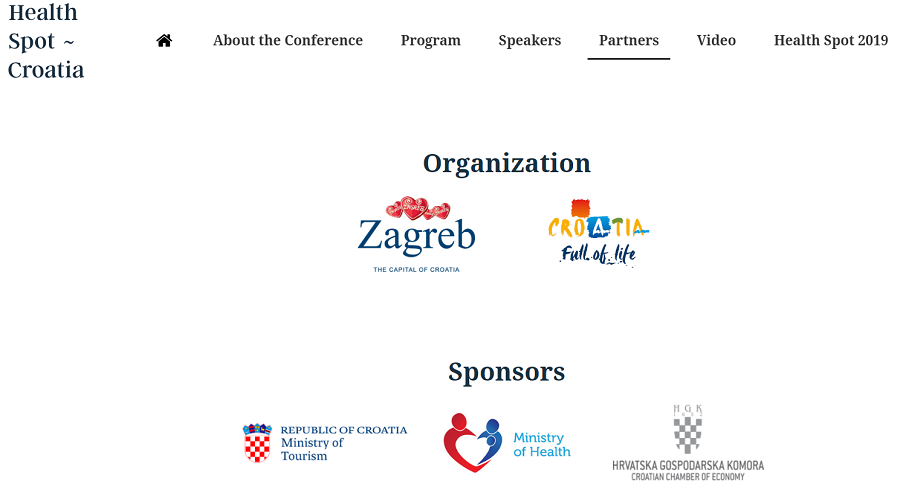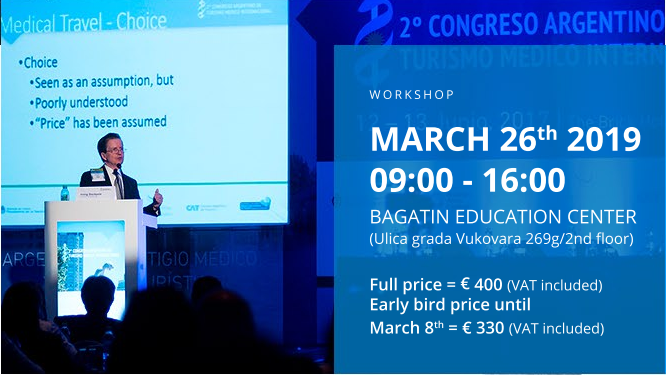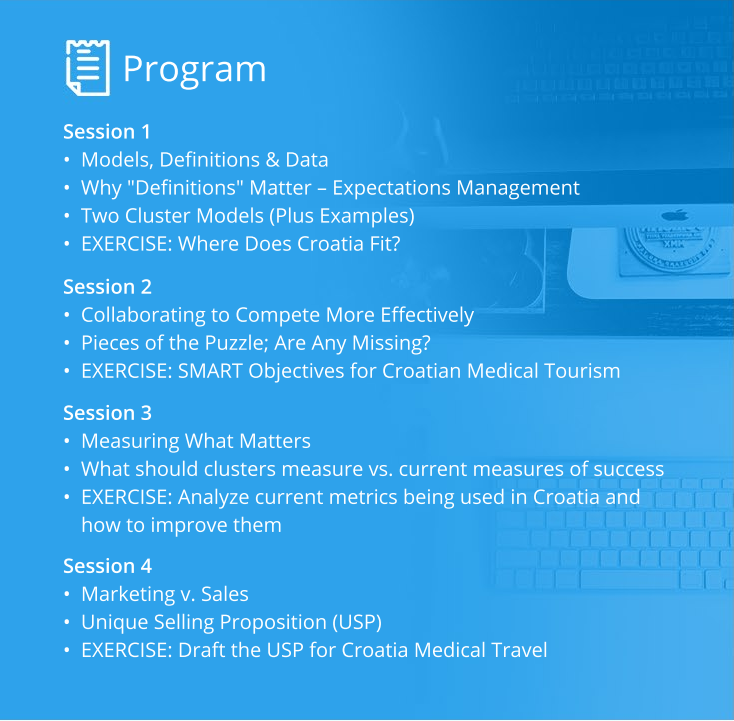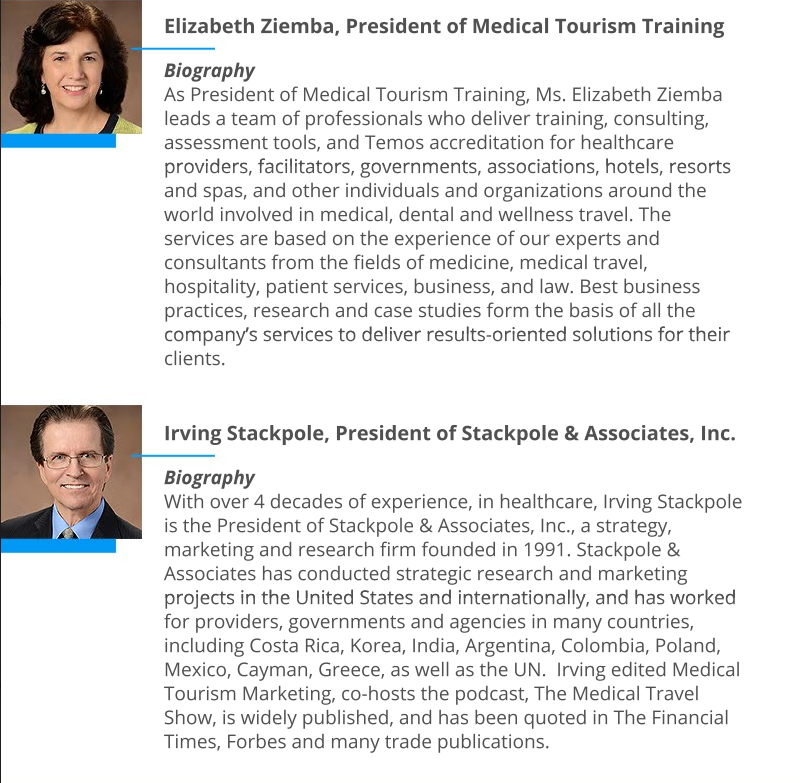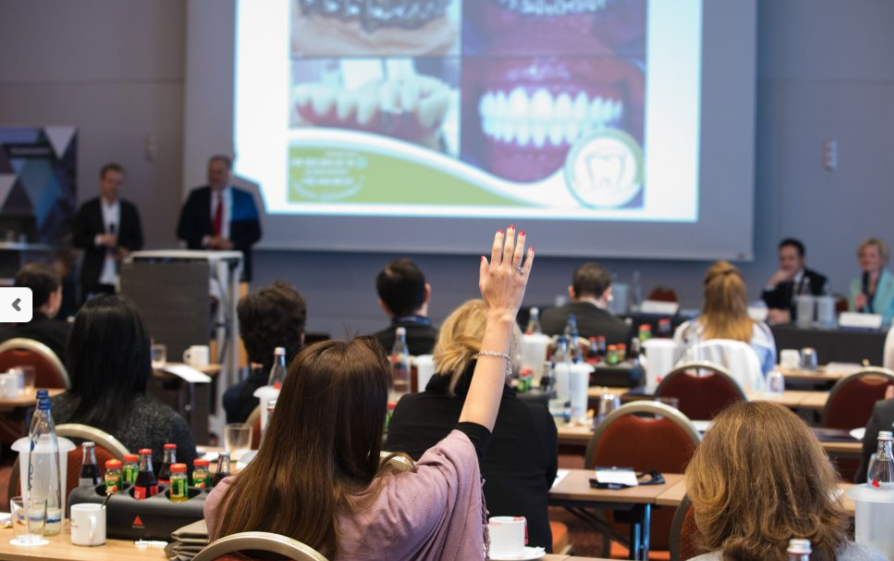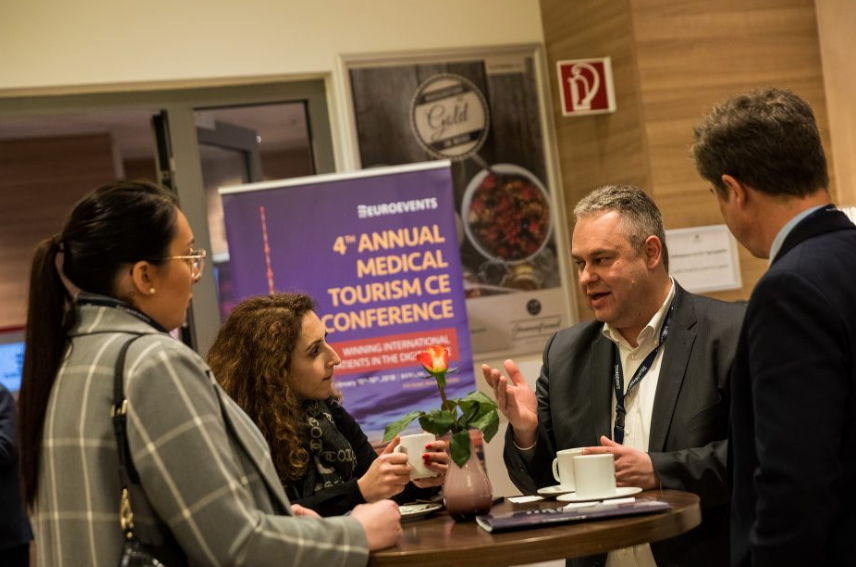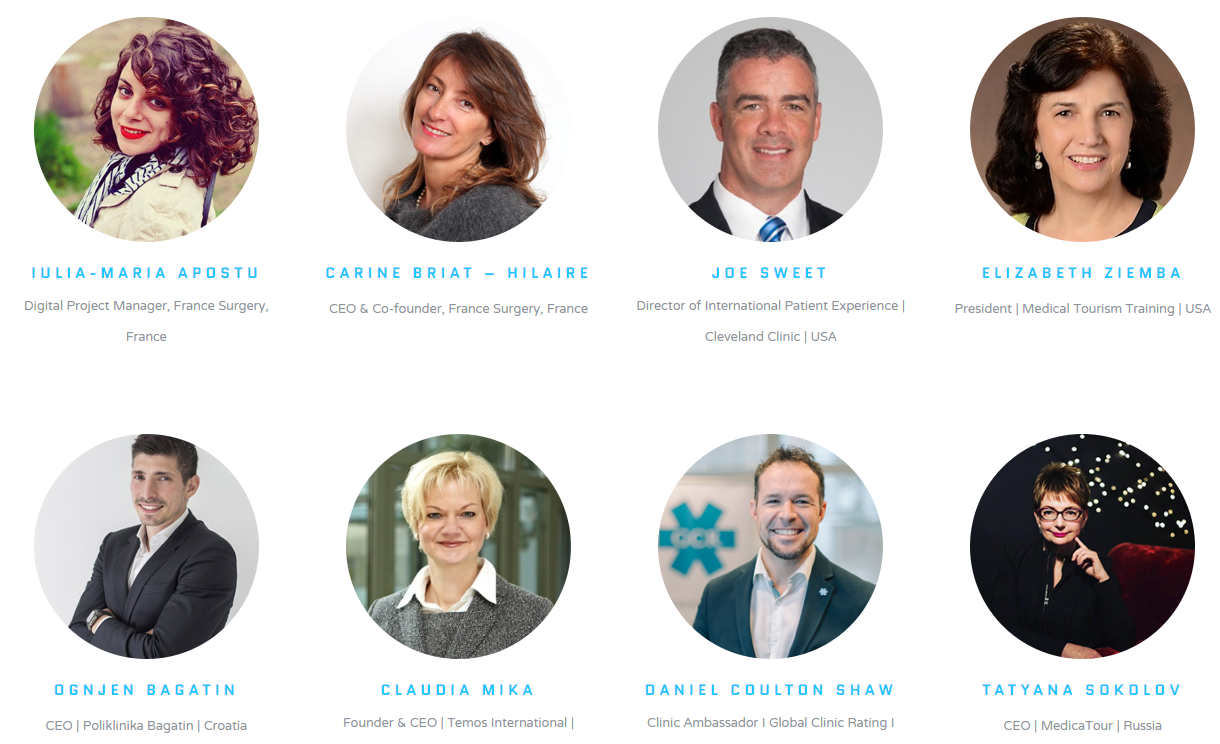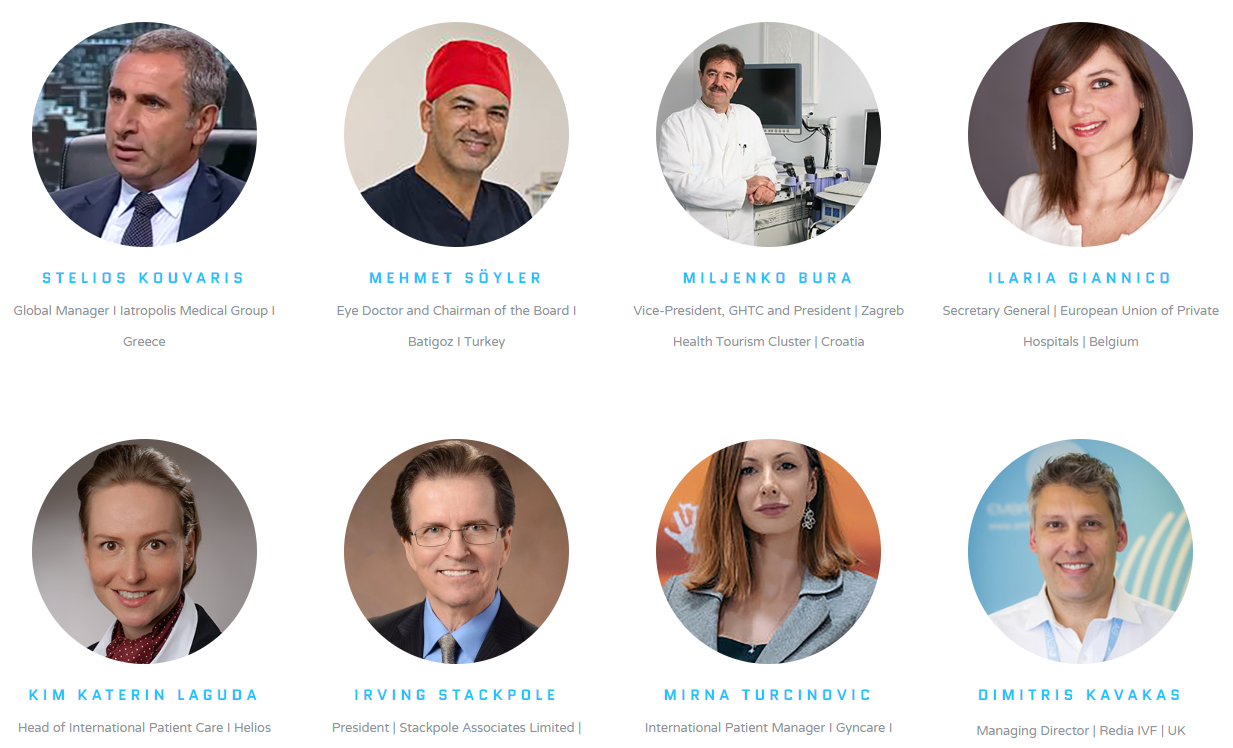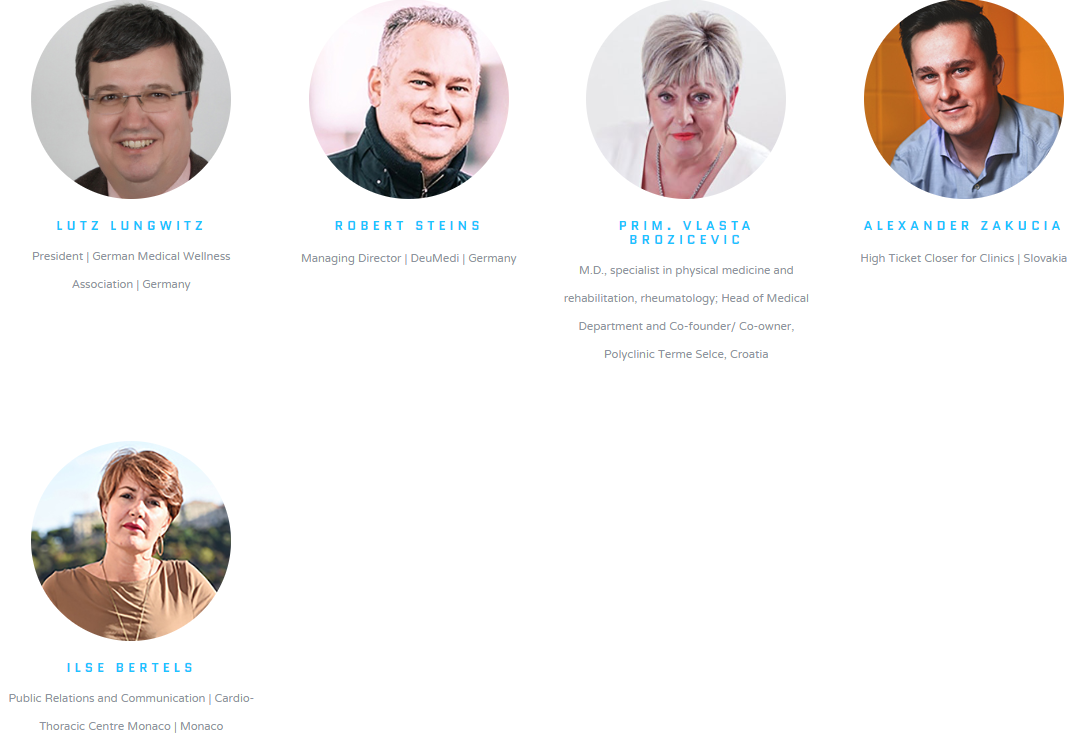Helping Croatia's Health Tourism Cluster: Stackpole, Ziemba at Bagatin
March 30, 2019 - More international medical tourism expert training in Zagreb as Irving Stackpole and Elizabeth Ziemba conduct a stimulating workshop of how to develop a health cluster. A workshop with some notable absentees.
Of all the aspects of life in Croatia that I am following as part of my job, none fascinates me more than the medical tourism sector.
As I have written previously, it is not an area I knew much about until 18 months ago before Bagatin Clinic CEO Ognjen Bagatin asked for a meeting and showed me what he and the industry were doing and what they were capable of. As my article, Health Tourism is Coming Home: Why Zagreb is the Next Big Medical Tourism Destination, showed, I was more than a little impressed.
And it was not just me that was thankful to Bagatin for my introduction to this untapped jewel of Croatian jewel and the Croatian economy. Over the last 18 months, I have met and interviewed numerous international experts, including the editor of International Medical Travel Journal, CEO of Malaysia Health Travel Council and the International Patient Experience Director of Cleveland Clinic. The majority owe their first contact to health tourism in Croatia to the efforts of Bagatin or mention his efforts very early on when talking about the industry in Croatia.
Ognjen Bagatin is currently in Cleveland, taking part in the Association of Croatian American Professionals medical tourism taskforce conference, but before he went, he organised yet one more specialised workshop for key stakeholders at the Bagatin Education Center in Zagreb, inviting medical tourism experts Irving Stackpole and Elizabeth Ziemba to run an intensive one-day seminar on how to develop a health tourism cluster.
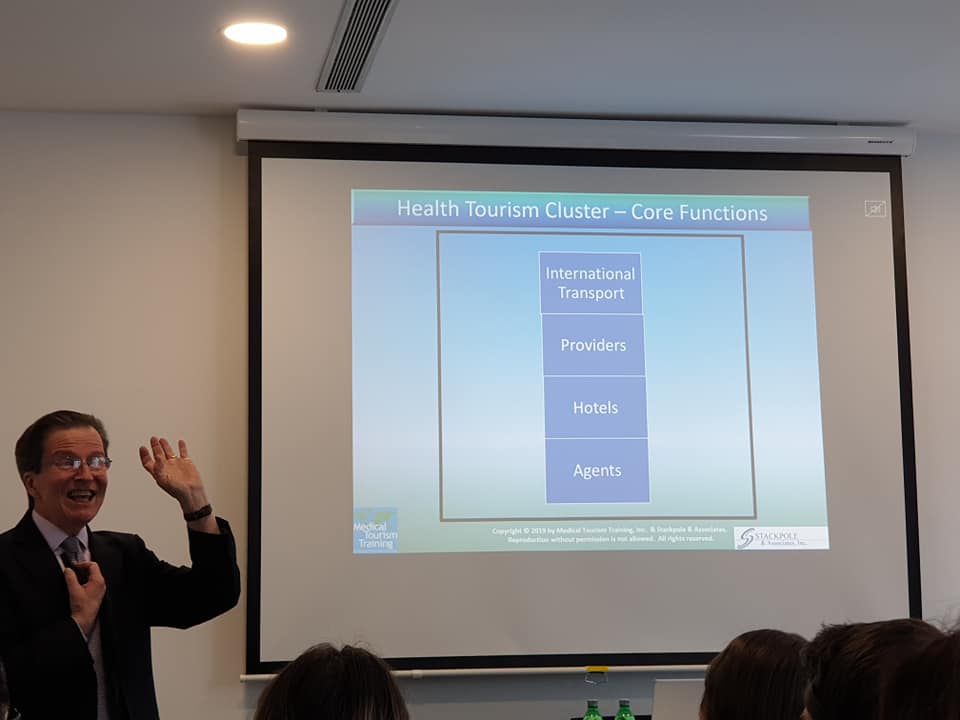
Both the timing and the topic of the seminar came at a poignant moment in the medical tourism story. After years of private clinics pushing the medical tourism story forward internationally with little or no support, official tourism bodies have started making noises about the importance of medical tourism in recent times. While that interest is both welcome and crucial to the success of Croatia's success in this potentially lucrative sector (as I wrote previously, international experts agree that Croatia has the ability to be in the world's top 10 medical tourism destinations within 10 years if its officials can only unite), some of the initial steps have hardly been encouraging.
The Zagreb Tourist Board's $50,000 health strategy document, which was released earlier this year at a dedicated health conference called Health Spot Croatia, came in for some criticism, mostly due to its very light content and absence of any strategy in its 71 pages. Here is what IMTJ had to say about the strategy document.
And so when two respected international experts with 55 years' combined experience in the medical tourism sector arrive in Zagreb with a specialised workshop on how Croatia should develop its health tourism cluster, one might expect quite some interest from the bodies driving the new Health Spot Croatia initiative - namely the Croatian National Tourist Board, the Zagreb Tourist Board, the Ministry of Health, the Ministry of Tourism and the Croatian Chamber of Economy.
Despite the $50,000 spent on a report which said very little, there was no Zagreb Tourist Board presence.
Nobody from the Ministry of Health.
Nobody from the Croatian Chamber of Economy
Nobody from the Ministry of Tourism.
The Croatian National Tourist Board was represented, the only stakeholder of five that had come to learn from experts in this critical sector for the development of Croatian tourism... and its economy.
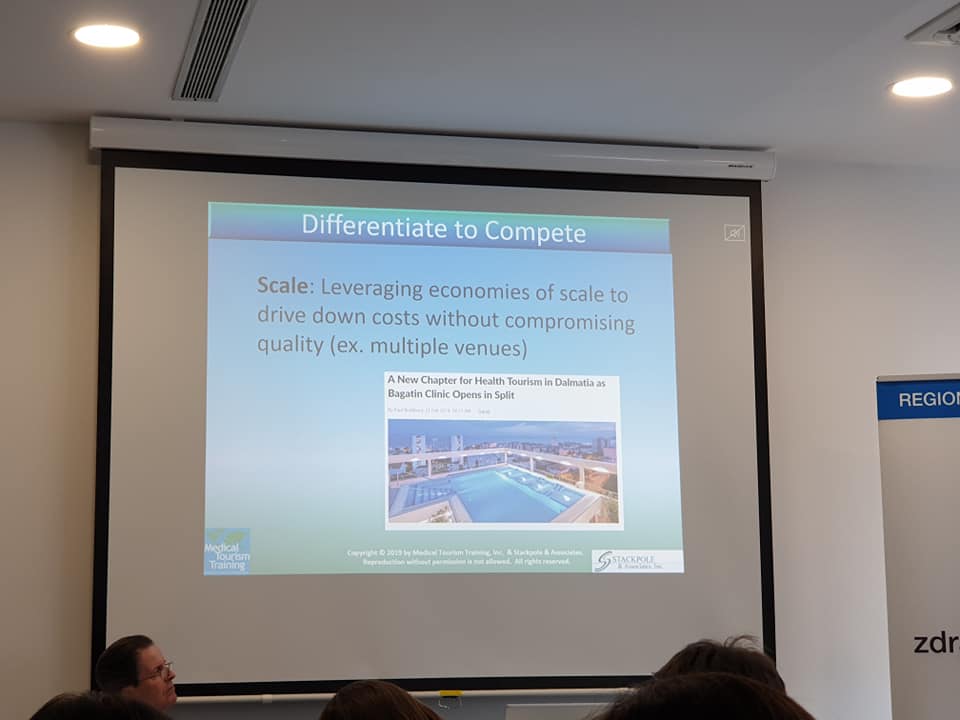
(Nice to see TCN included in the presentation material - the opening of Bagatin Clinic in Split as an example of leveraging economies of scale)
Their absence was all the more lamentable as the workshop was EXACTLY what Croatia's health tourism stakeholders need at this time to polish their rough diamond and make it shine as one of the best in the world.
Having observed Croatian tourism for several years, I don't think I am betraying too many secrets when I state that tourism for the most part just happens in Croatia. When you have a coastline and over a thousand islands with the crystal clear Adriatic and azure skies above, selling sun and sea tourism does not require much effort. That easy win has transferred itself into other sectors of tourism with a mentality of 'the tourists will come anyway' all-too-pervasive in the approach to tourism in general.
Irving Stackpole and Elizabeth Ziemba, a husband and wife team, whose expertise and chemistry made them ideal co-presenters, offered something which was eagerly accepted by those who did attend - a road map of how to develop the building blocks of health tourism in Croatia, using solid methodology and examples, and by inviting participants to do their own thinking in the Croatian scenario.
What I liked about the workshop particularly was how Stackpole and Ziemba showed what a health cluster was NOT, before then building up a picture of what it could be. It was the kind of systematic analysis and approach to a tourism sector that Croatia could benefit from in general, not just for its health tourism. Stackpole went into great detail about what a health cluster should be, for example. The core elements of Transport, Hotels, Agents and Service Providers, yes, but a cluster is multi-layered. Secondary components of a cluster include local transport, restaurants, activities, attractions and entertainment. For more details of the tertiary layers and beyond, I recommend you sign up for one of his seminars.
Rather than some loose usage of a fashionable term, the Stackpole/Ziemba duo showed concrete examples, both local and international, to illustrate their points, as well as encouraging audience participation to help the thought process along. The best example of a cluster in Croatia was one that nobody would probably have contemplated - Rimac Automobili.
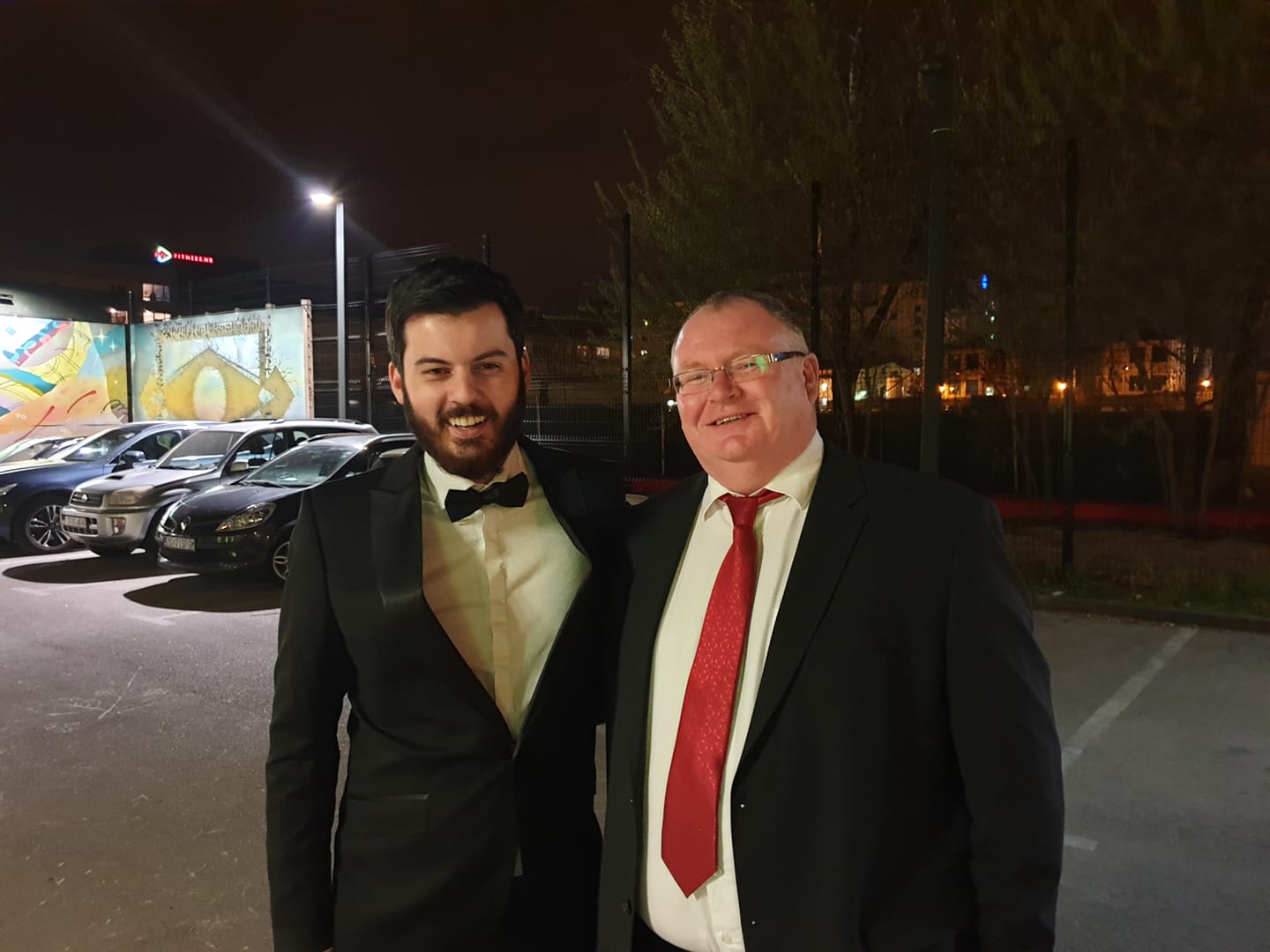
(TCN at the EY Entrepreneur of the Year Awards this week with TCN fan Mate Rimac, CEO of Rimac Automobili, a perfect example of a successful Croatian cluster, according to Irving Stackpole and Elizabeth Ziemba)
Here was a young Croatian entrepreneur, who has built the fasting electric supercar in the world in a country with no car industry, whose battery technology is increasingly used worldwide in the automotive industry. And he has done so with a network of suppliers and personnel around him in his native Croatia - all key cogs in the bigger picture. A truly successful and interconnected cluster in Croatia. Proof that it can work.
The most stimulating part of the seminar for me was the session in which participants broke up into small groups to analyse its competition and what Croatia does better and what is unique about Croatia's offer. This is an aspect of tourism planning that this country badly needs. It is not enough to say that we have the best food, the best wine, the best of everything. Analysing what makes us unique and what the competition does better than us, that we can learn from and improve, is imperative if Croatia is to succeed with its medical tourism opportunity, which I am convinced it will in time.
I left the seminar with mixed feelings. On the one hand, I was much encouraged by what I had seen and learned. After 18 months following this industry, not only do I see Croatia's potential, but so too do many international experts. And they also possess the tools, expertise and willingness to help Croatia succeed. The sadness came from the lack of engagement of the official stakeholders, whose support is crucial for Croatia to develop this fabulous opportunity.
I truly hope that the various stakeholders can find a common path. With the Croatian economy in the situation it is, the prize is too valuable to mess with. And the benefits for the country as a whole are tantalising.
To follow the Croatian medical tourism story, check out the dedicated TCN page.
Croatia Can Be Central Europe Medical Tourism Hub in 5-10 Years: Interview
March 20, 2019 - More positive noises for the Croatian medical tourism industry from International Clinic Mentor Daniel Coulton Shaw, following his facilitation of the 5th Annual Medical Tourism Conference in Zagreb last week.
He arrived with a boy band in Slovakia and helped to build a friend's dental website, only to turn that business into Slovakia's leading dental tourism clinic. As if that was not enough, he then put together GCR, Global Clinic Ranking, a business which - along with his clinic mentoring - makes Daniel Coulton Shaw not only a regular visitor to the Croatian medical tourism scene, but ideally placed to comment on the direction Croatia is, and can be, taking. TCN caught up with Coulton Shaw after the conference.
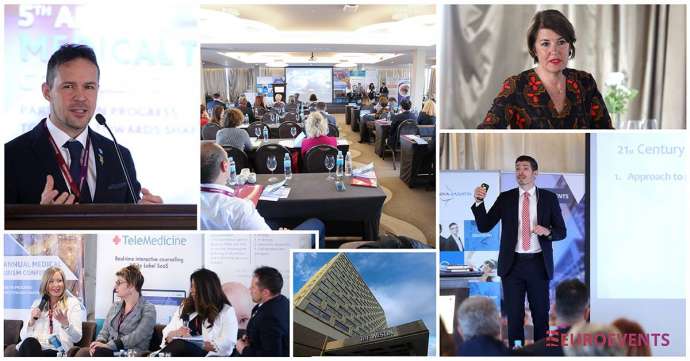
1. You have just made your latest trip to Zagreb where you were facilitating at the 5th Annual Medical Tourism Conference at Hotel Westin. How did it go and what did you learn?
I had the pleasure of returning to the hotel Westin in Zagreb again for yet another medical tourism conference (I attended the HTI conference there last year).
The main difference for me with this particular conference (MTCE organised by EuroEvents annually) are the practical learnings and networking opportunities available.
As rather than "fluffy talk" and irrelevant statistics - I prefer data and ideas that I can apply immediately to the clinics & hospitals that I work with as well as notice what "doesn't work" in the realm of reaching patients from abroad.
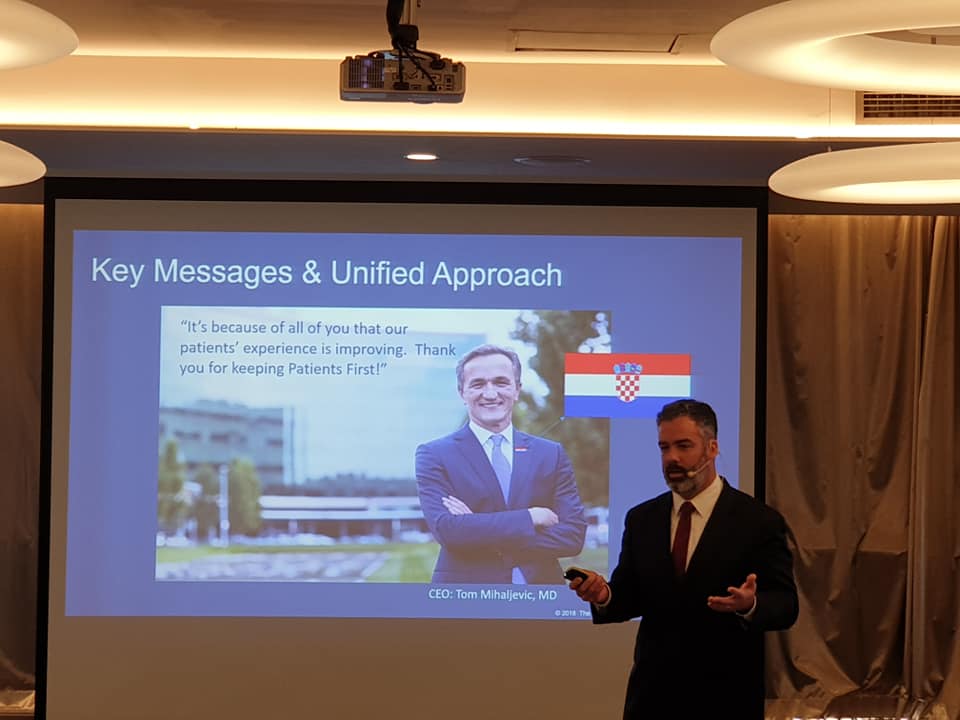
In particular, I was impressed to learn from Joe Sweet - Cleveland Clinic - despite their immense size and reputation - they're still dealing with challenges that most private clinics and hospitals face - generating interest, converting that interest into patient bookings, and making the most of the patient experience to further improve treatment results, reputation and revenue. He had some excellent examples of how they approach those challenges and I saw the same principles could be applied to local clinics & hospitals.
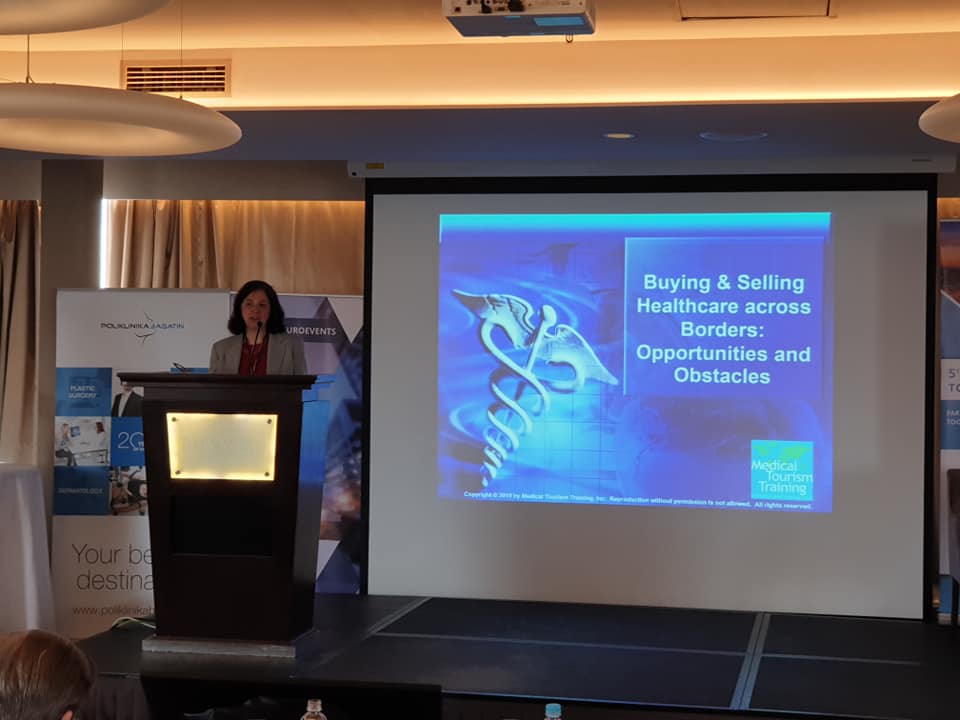
Elizabeth Ziemba covered the changing market of reaching individual patients towards reaching larger groups, national companies, insurance agents and governments instead, a trend I too see happening worldwide currently, especially with private Asian clinics.
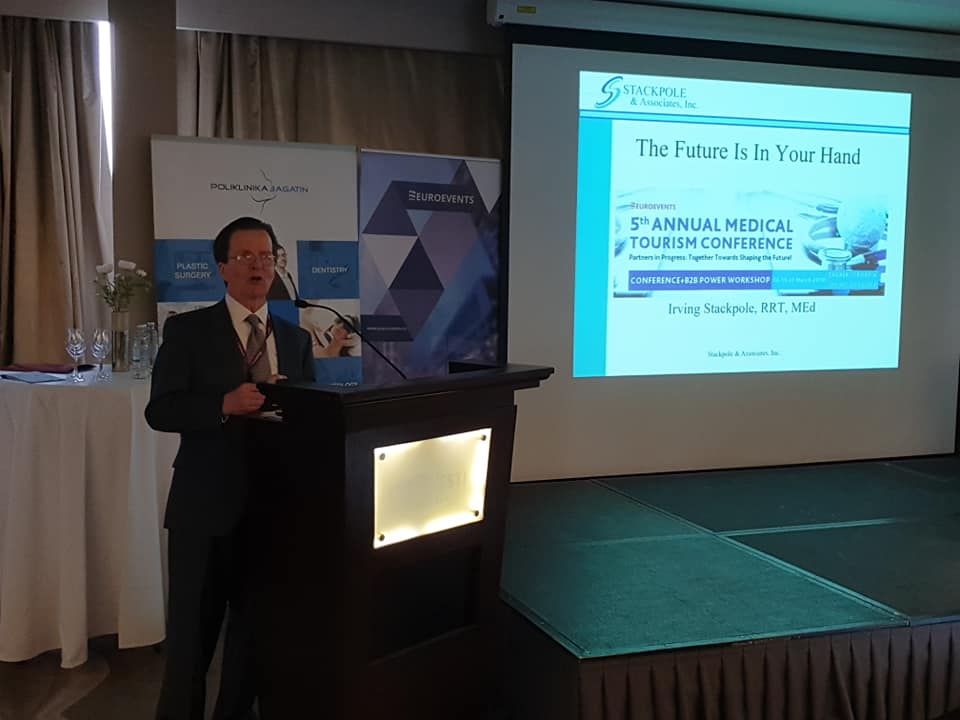
Irving Stackpole demonstrated the changing face of "medical travel" and how medical travel may not be as necessary as we think in the near future as personalized healthcare becomes more readily and affordably available through the rise of new healthtech capabilities. I am very aware of this developing trend, that will cause a number of clinics & doctors to close their doors to patients if they don't prepare well for this new digital era.
My colleague, Alexander Zakucia brought a new topic to the table at healthcare conferences - the call centre and how to covert more patient leads to bookings - I haven't seen that presented elsewhere and was glad that it was a well-received topic by the attendees present at the event.
Finally, Claudia Mika demonstrated the positive effects of quality standards and accreditation on the overall patient experience. We're both advocates of bringing the highest-level medical quality options to the medical traveller, and am glad that she continues to remind medical tourism providers of the impact of how an optimized patient journey can be through keeping to standards.
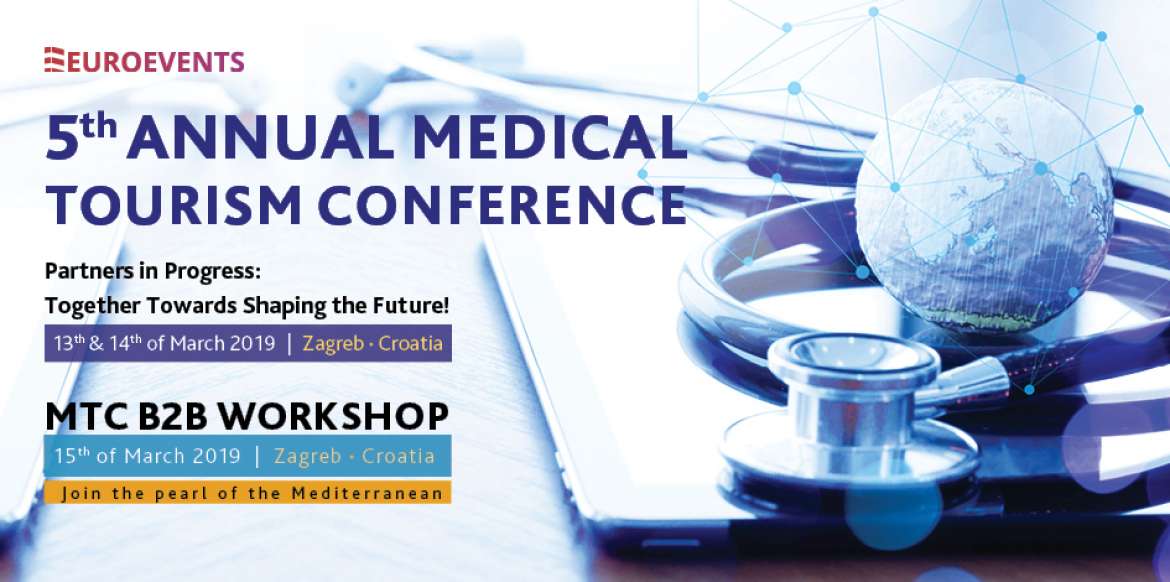
2. For our readers who are unfamiliar with you, tell us briefly about your background in the medical tourism industry.
I came into the "medical travel" industry completely by accident. As a professional musician, I managed the website for my Celtic rock band, and was asked by a doctor friend in Slovakia to help with his website and build a "fan base" for his clinic. I had never before heard of the concept that people could travel abroad for medical treatment.
For my friends' new website, I did a bit of research and saw that Brits were increasingly travelling to Hungary and Poland for cheaper dental treatment options. So I set up a website called dentalholiday on a co.uk domain.
To our surprise from a 3 person dental clinic, we quickly developed into Slovakia's leading dental clinic for international patients within just a few years reaching over 10,000 patients - despite Slovakia not being known at all as a health choice destination.
The main hurdle was proving to potential patients that despite the cost savings, having treatment abroad offered them an even higher level of quality than their own home clinic. I created a simple model based on hard facts to prove this to patients, and the idea worked magically.I'm a fan of using data to manage many decisions I make both professionally and personally, and through a joint partnership with my friends in Google who were intrigued by my model of reaching patients, we developed a clinic rating that assesses almost half a million clinics & hospitals worldwide, to help patients make a transparent, safer choice of private healthcare.
Since then I personally work with a number of clinics & hospitals throughout the world, simply implementing what I've seen work elsewhere, helping them solve challenges and produce measurable results.
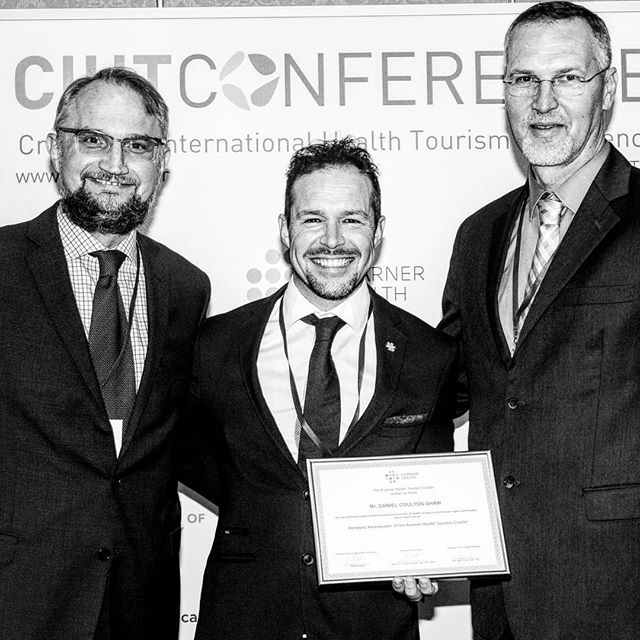
3. You are a regular visitor to Croatia, working with many clinics here. How do you view the industry here, and how has it changed in the last 5 years?
Something unusual is happening in Croatia. Elsewhere I've seen governments and associations pushing clinics and hospitals to "step up their game" and make the region more attractive for medical travellers. But in Croatia, I've noticed much more of the opposite - a cluster of private clinics & hospitals pushing governments & associations to "step up their game" and support them in making the region more attractive for medical travellers.
This reminds of progressive countries where the authorities have thankfully taken a step back and actually started listening to their people, and turning to the private companies for the direction that bring in huge revenue streams to the regions and countries as a whole.
I am fully confident that if the healthcare sector can make their voice heard enough and some basic changes implemented from the side of the authorities, Croatia has a real chance of becoming the new medical tourism hub of central Europe within 5-10 years.
4. Several experts have said that Croatia has the potential to be in the world's top ten medical tourism destinations in the next 10 years. Do you agree with that assessment, and what needs to happen to make that a reality?
Apart from the obvious geographical benefits - easily accessible from Italy, Switzerland, Austria and former Yugoslavia regions, coupled with the sun /sea/mountain destination perception, I have seen that there is a growing, measurable, perception of "excellence" towards the country in the sports, private business and modern health sectors.
As for making that happen, please allow me to share with you a simple roadmap that I consider to be the way forward.
All my data & research with GCR on over 10,000 patients points towards the fact that today's medical tourism consumer in Europe makes their decision across 3 factors:
1. Price
2. Proximity
3. Perceived Quality
So in the case of Croatia, I see the pricing & positioning of healthcare in the mid-range as are successful healthcare regions in the Czech Republic, Poland, Hungary, Slovakia & Romania.
By "proximity" I'm thinking of "how easy can I get there?" "do they understand my culture/language" "do I feel safe there?" and with Croatia, there's obviously work still to be done. Flight connections, although on the increase over the past 5 years are still not at the level of competitor countries. Ferry connections over from the mid and south of Italy or Montenegro are still not at frequency and speed needed, and the infrastructure for emergency helicopter landings has not been set up.
Many Croatian clinics have proven to be able to work in Italian, however further reputation of solid language abilities in German, Arabic, Russian, Chinese and English needs to be developed among the healthcare community to the level of that of their peers (Hungarian clinics do well with English & German, Polish clinics with Norwegian & English, the Czech Republic with Russian and English).
Potential patients from further afield than neighbouring countries need to be reassured that the Croatian environment is safer and more welcoming than currently perceived and that international standard rights, precautions and partnerships have been set up in case of medical complications that arise after returning to their home country.
As a newcomer, Croatia has no real "proof of quality" reputation yet within elective & advanced medical treatments apart from within the sports community, so I believe that this quality reputation would seem to be Croatia's' biggest hurdle.
Sharing transparent treatment outcome data from the region along with successful case studies and 3rd party proof of quality through ratings or accreditations would certainly help accelerate this process.
Finally, the huge Croatian ex-pat community could be mobilized to speed this up even further - a method proven in the UAE by bringing their ex-pats home through incentivized medical treatment, and in Hungary with supporting talented Hungarian doctors back to work in the country.
5. Let's talk realistic and achievable target markets for Zagreb and Croatia. A recent strategy document for the Zagreb Tourist Board recently identified target countries like Slovenia, Italy, Austria, Germany, Russia, USA and the United Arab Emirates, but not the UK. Do you agree with this assessment, and if not, where do you think the Croatian medical tourism industry should be focusing?
There are a number of strategies that I've seen work in neighbouring countries attracting patients from a wide range of nationalities to them for medical treatment, for example:I know clinics in Hungary that have Koreans as their no.1 patient due to partnerships with the KIA and Samsung factories.
I know clinics in Poland that have Chinese and Africans as their no.1 patient due to partnerships with the local governments and communities.
I know clinics in Slovakia that have Arabs as their no. 1 patient group by supporting the flight route to Arab countries.
However to begin - I would start at home. Meaning, that I'd focus on the ex-pat communities living within Croatia for professional or personal reasons.
Once awareness of affordable, quality and likeable has reached a tipping point locally, I'd consider the untapped medical options of patients in Italy, Serbia, Slovenia, Montenegro, Albania, Bulgaria - so far being reached only for dentistry and low-risk elective treatments.
Then I'd consider the German-speaking market, as an alternative to options available in Hungary & the Czech Republic by proving quality care options.
Only then I'd consider working with the UK & Scandinavian markets - very different markets needing a completed different approach here, but that key would certainly first need to be supported by extra suitable flight connections year-round to be a sustainable business model.
Alongside that, as I mentioned earlier, I'd always consider incentivizing Croats abroad and use current positives such as the sports, pioneers in health and the film industry to drive patient awareness across the globe.
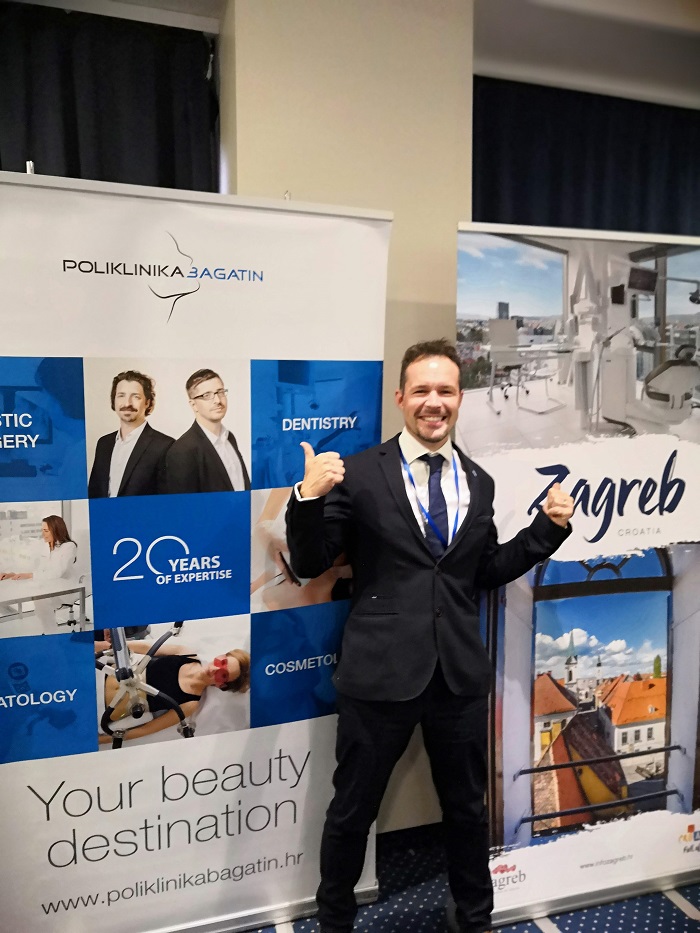
6. You work with a lot of clinics all over Europe. Which ones stand out in Croatia, why and for which types of healthcare?
Yes, I work with a little over 200+ private clinics with Croatia, and it would be unfair to not mention all of them, as by working with my company (GCR) they have demonstrated their commitment to providing international standard medical care for their patients and implementing "best practices" to become better.
I can, however, mention some very unique medical facilities that I feel are unsurpassed worldwide. I have personally visited 1000's of hospitals and clinics on every continent and have rarely seen clinics like Rident, Kalmar, Akromion, Svetlojst & St. Catherines for example - each of them bringing something very unique to the groups of patients they cater for.
Then there are the private healthcare personalities of Croatia - Doctors such as Nemec, Brozičević, Simunic, Gabric and Primorac, for example, who have in the past brought their personal reputation as medical experts to the international table.
I am personally very grateful to Anita Šimunić from Polyklinika IVF, Alfred & Vladimir from Kvarner Health and Ognjen & Tea from Bagatin who have been instrumental in introducing me to the challenges and opportunities of Croatian private medical care.
The Bagatin clinic team had proven a very workable model of local & international expansion that can be implemented into other local clinics as well if they are willing to pay the price.
On the sweat and shoulders of these core private clinics, doctors and medical teams the Croatian medical travel industry is currently held, many at the sacrifice of their personal lives, and I hope that they will come to see their fruits of their efforts 10x in the years to come for their own businesses, the private healthcare industry and the country as a whole.
Apart from future financial or political setbacks that could occur within this region of Europe, I believe that Croatia has a solid 5-10 year window and is well-suited to make it to the forefront of becoming a medical tourism hub of central Europe. After that, all big data signs are showing that private healthcare options will be transformed by personalized, at home technological and scientific advancements beyond our current reach around 10-20 years from now.
When the age of "singularity" arrives - the moment when artificial intelligence surpasses human intelligence, medical travel will become a relic of the past, not only for Croatia but for the rest of the world as well.
I'm sure we'll then have more pressing issues to deal with :-)
7. Finally, I have to ask you about a comment you left on one of my recent articles. The subject was the recently published Zagreb Tourist Board medical tourism strategy document. My article was, Burning Dollars in Zagreb: from Cancelled Conferences to Health Tourism Reports. My article took a critical look at what Zagreb got for its $50,000 investment, something echoed by International Medical Travel Journal Editor Keith Pollard in an article today. You left the following comment on my article last week - do you care to elaborate on it?
I will, entirely free of charge, provide the Zagreb Tourist Board a Medical Tourism Strategy Map to replace the one that they were misleadingly provided.
It would be based on the fact that they would assign a full-time 5-6 person team chosen by me to follow out the steps in the strategy map for the next 2 years along with a budget of what they paid for their previous report for the implementation of the strategy.
I fully support the growth of the region with my whole and knowledge of international medical travel trends and strategies and believe that now, with the momentum of select private clinics and the increased visibility of Croatia in the world - we could actually bring Croatia as a contender as new medical hub of central Europe.
Yes, Croatia has gained a number of trusted friends over the past few years in its efforts to reach more international patients. These individuals, myself included, know the country and it's private clinics well supported by experience and knowledge of working with other countries in similar situations.
I believe that putting together an actionable plan, based on facts with core, measurable milestones and scope for adjustments would be a step forward. This, of course, would have to be consulted together with key private clinic & hospital owners from the region and have the commitment of a task-based, full-time team with an allocated budget to make this happen.
You can connect with Daniel Coulton Shaw via LinkedIN, the Global Clinic Ranking or his Slovakian dental clinic.
To follow the latest in the Croatian medical tourism story, check out the dedicated TCN page.
Irving Stackpole, Elizabeth Ziemba Interview Ahead of Zagreb Health Cluster Seminar
March 18, 2019 - More international medical tourism expertise is heading to Zagreb to help grow the Croatian medical tourism story, as Irving Stackpole and Elizabeth Ziemba host a boutique seminar at Bagatin Education Centre in Zagreb next week.
The number of international medical tourism experts passing through Croatia these days is really quite incredible.
Although covering the health tourism industry is only a small part of what I do, it seems that every time I look at it, there is another global expert in town. I got to meet and interview Joe Sweet, International Patient Experience Director for the world-renowned Cleveland Clinic last week. Sweet was one of 22 international speakers at the 5th Annual Medical Tourism Conference in Zagreb, speakers which also included Irving Stackpole and Elizabeth Ziemba. You can read more about the conference here.
I had already been in touch with Stackpole and Ziemba by means of an email interview ahead of their next visit to Zagreb, on March 26.
While there are numerous conferences in the field of medical tourism in Croatia, there is even more happening in the background, with the Bagatin Education Centre in Zagreb holding a range of events. This is where I met medical tourism branding guru Ilan Geva at a recent workshop, and where Stackpole and Ziemba will be hosting a workshop on Taking Cluster Development to the Next Level: Changing the Course of Medical Travel.
1. It is great that you are coming to Croatia to share your expertise with local stakeholders. Tell us how the trip came about and anything else you will be doing while here.
IRVING: While we met Ognjen Bagatin years ago, it was at the World Health Care Congress in Washington DC in 2018 when we had an opportunity to discuss with him in detail the evolution of the health tourism markets in Croatia. Developing a workshop in Croatia came from that conversation.
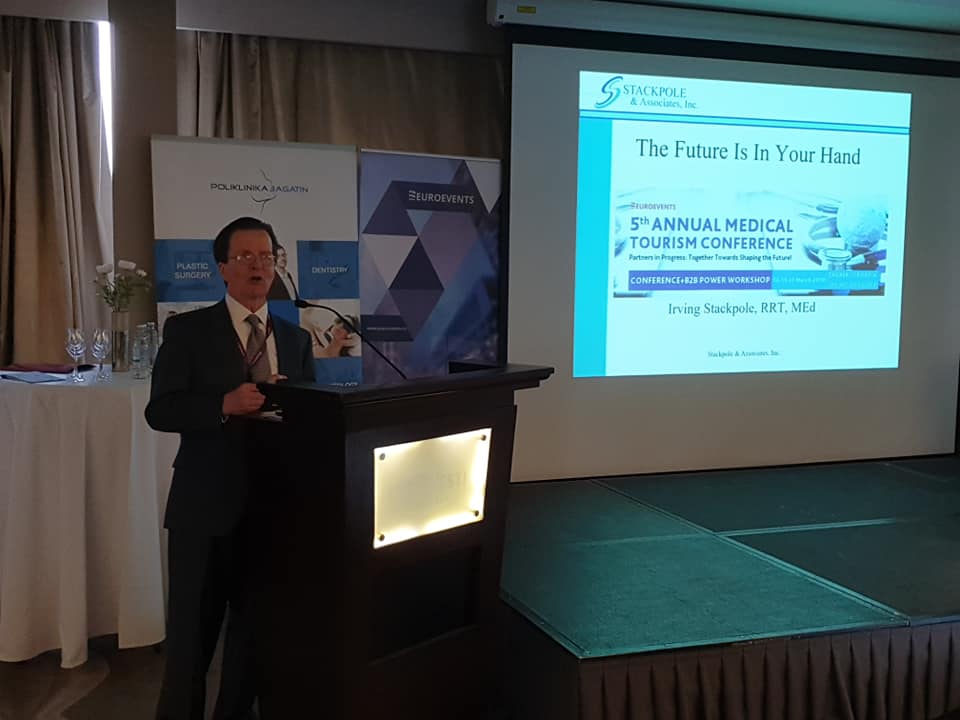
2. You come at a time when the Croatian medical tourism industry is starting to get organised. The recent Health Spot Croatia conference included all the major stakeholders. How would you assess the current state of the medical tourism industry here, and what is the potential?
IRVING: Only having been to Croatia one time, to Opatia, it would be difficult to draw conclusions from that experience. From what we understand so far, there is ambition and high level of interest; these are always good initial ingredients to success!
ELIZABETH: Having just returned from a two-day conference in Zagreb, we have gained a bit more insight into the status of the health and medical tourism sectors in Croatia. While we have much more to learn and explore, it is clear that many key players are interested, engaged, willing to work hard and learn about the opportunities and obstacles.
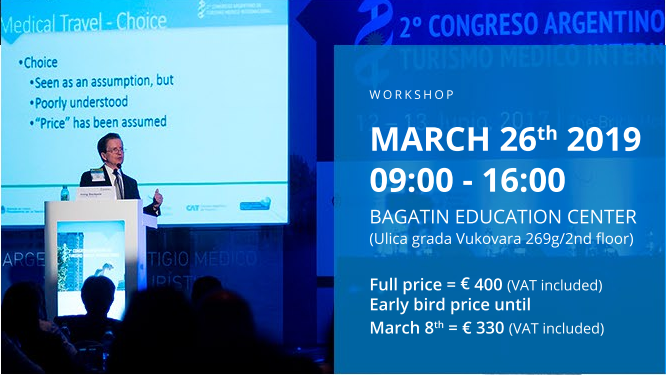
3. What do you see are the competitive advantages that Croatia has in the global market?
IRVING: From what we understand, there is a high level of proficiency among the health and medical professionals in the country. And apparently the private healthcare infrastructure is also very advanced although we have not as yet had an opportunity to experience this firsthand. Quality of the healthcare services is of course paramount.
ELIZABETH: The country has a solid base of tourists upon which to build and enhance the overall reputation and brand of the country. It has made some progress in terms of the availability and quality of dental and cosmetic services so that with good leadership and cooperation from the clusters, valuable lessons can be learned from what has been achieved to date as well as guidance for what can be expanded and improved in the future.
4. You have vast international experience in medical travel and have both travelled the world. As Croatia takes its first small steps in the industry, which countries should it be looking to learn from, and why?
IRVING: While there are easy comparisons between countries such as Costa Rica, the hard-learned errors of every country or region can be useful to Croatia. It is essential that Croatia develop its own „unique sales proposition“ based on its assets and differentiators. We will be focusing on this in our workshop.
ELIZABETH: Costa Rica is a good example because it is of similar size in population and geographically as Croatia. Plus both countries have access to close markets in other countries – the US and Canada for Costa Rica and Italy, Slovenia, and other neighboring countries for Croatia. Costa Rica has an interesting leadership model that has good lessons to share with Croatia.
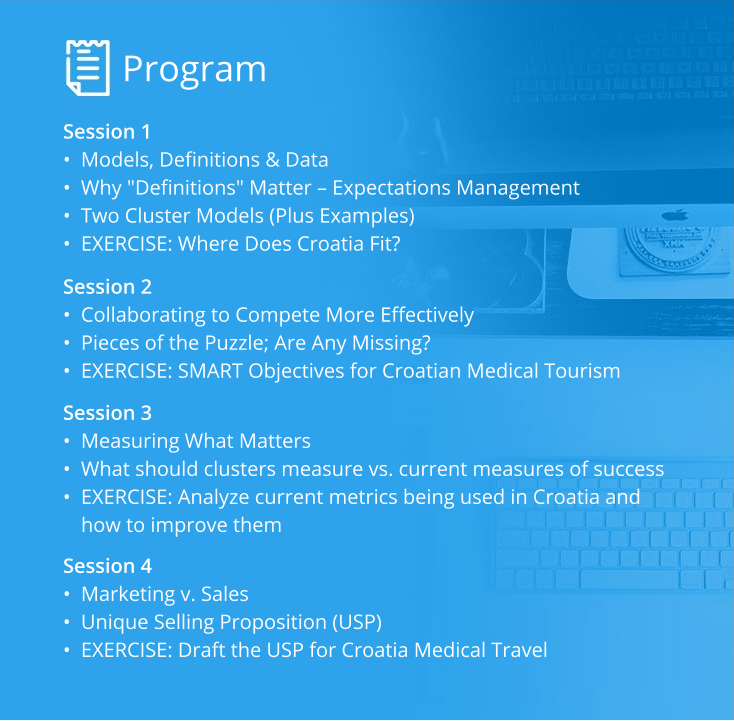
5. Your workshop theme is taking cluster development to the next level. Croatian health tourism has several clusters - Kvarner, Zagreb and Pannonia for example - but it is struggling to develop a national brand, which is surely the priority. How do clusters work together to strengthen the national brand while developing their own?
IRVING: In our workshop, we will focus on what a cluster is and what it is not. All of the organizations calling themselves „clusters“ are probably not clusters but are types of marketing collaborations. The functions of successful clusters, such as competition, monitoring and measurement will be emphasized. And regarding the national brand of Croatia, it is unlikely that medical tourism will define this for the country. Rather, understanding the attraction of Croatia in the travel and tourism markets, the extraordinary loyalty of the diaspora and the underlying assets of the country – these will provide an opportunity to leverage a medical tourism brand for Croatia.
ELIZABETH: This is an excellent question which we will answer during our workshop. The magic formula depends on strong leadership, a clear vision for the country's national brand, the ability to collaborate and compete while maintaining a unique selling proposition. Each of these components requires hard work.
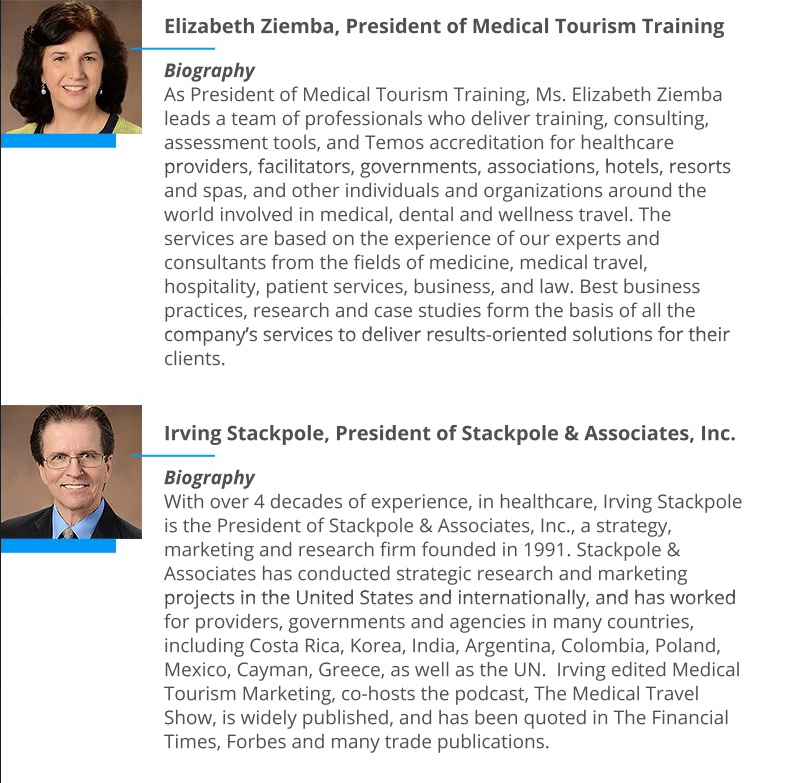
6. Where do you see Croatian health tourism in 10 years, and what needs to happen to get it there?
IRVING: We certainly don't have a crystal ball! There are 1000 small steps that can be taken to improve the markets for health tourism to Croatia. Based on the energy and commitment we have witnessed, it's clear that Croatia will take 1001.
ELIZABETH: We would be happy to be hired to create a health tourism strategic plan for the country. Both Irving and I have experience creating strategic plans, marketing plans, and other road maps for countries, regions, and cities. It is a complex process that requires research and knowledge.
7. For those thinking of attending the workshop, explain what attendees will take home from a day with you.
IRVING: First and foremost, a clear eye and sober look at the international health tourism markets as they relate to Croatia. Second a structured approach to the evolution of a cluster in Croatia which will further the goal of developing Croatia as a premier health tourism destination. Finally, the skills needed to create a unique sales proposition at the clinic or national level, which will improve your competitive position.
ELIZABETH: Whether members of a cluster, government representative, or healthcare provider, participants will learn more about how clusters do or do not function; how to collaborate and compete within clusters; as well as to have the tools to create a unique selling proposition for the country and their organizations.
For more information about the seminar and to reserve a place, contact Bagatin Clinic.
To follow the momentum of the Croatian medical tourism story, follow the dedicated TCN page.
Cleveland Clinic in Croatia: Interview with Joe Sweet, Patient Experience Director
March 15, 2019 - The 5th Annual Medical Tourism Conference in Zagreb brought together a rich collection of international experts, including Cleveland Clinic's Director of International Patient Experience, Joe Sweet.
It has been another important week in the Croatian medical tourism story, as the 5th Annual Medical Tourism Conference in Zagreb, organised by Euro Events, brought a very international group of stakeholders to the Croatian capital for two days of conference followed by a B2B workshop today, as TCN reported earlier.
Among the impressive list of speakers was Joe Sweet, Cleveland Clinic's Director of International Patient Experience, whose presentation was entitled Creating a Consistent Approach to a High-Quality Patient Experience. Sweet spoke eloquently about the Cleveland Clinic's patient experience journey, outlining successful methods to create a successful patient experience culture, as well as innovative and digital patient experience approaches. TCN caught up with Sweet before his flight to learn more about his visit to Croatia.
The Cleveland Clinic in Croatia. This is a great thing for the Croatian medical tourism industry. How did it come about that you are in Zagreb?
Firstly, our CEO Tom Mihaljevic is Croatian. But actually the reason I am here is driven by Ognjen Bagatin of Bagatin Clinic who came to see us in Cleveland to learn about the patient experience and our Patients First initiative. I met with him almost a year ago now, and we really hit it off from that first lunch we had together. I learned more about his personality, his drive and what he is trying to achieve. That was very impressive. And then this opportunity came up with Euro Events to come over and share our story, and Ognjen really connected that, making it happen.
We are interested in spreading the news of who we are and what we do and forming those connections around the world. So we see this as an opportunity to do that, to get out there and build more of those relationships.
Interesting. Tell us a little about Bagatin. Here the clinic is known for its excellence and being very proactive internationally in promoting Croatia as a health tourism destination. How does it rate on a global level?
I think its an up and comer. I know that Deloitte has ranked it as one of the fastest growing startup clinics. He has been at it since I think 1995, and we are keeping an eye out on Ognjen now, since he approached us, to see where he is going and where they are expanding to. And we're impressed. Impressed with him as a leader, his style, his team. We've seen his facilities and are impressed by the organisation, the cleanliness, the professionalism of his staff. So he is doing impressive things, and I think some great things are coming.
How does Croatia rate as a medical tourism destination?
I have to be honest, I am not a medical tourism expert. I was here to broaden the Cleveland Clinic story and our patient experience, and how we handle and support our international patients coming in.
But just from my limited experience of being here these last few days and seeing how it operates and what I have learned at this conference, I see Croatia as a hot spot for people to come and get their healthcare. But then also to enjoy their time here, so potentially to bring their family along, enjoying this wonderful city or visiting the coast. So there are real opportunities and the dual benefit of combining a vacation with medical treatment. I know that there are other beautiful destinations in the world, but Croatia really is a great place to come.
From the Croatian perspective, the Cleveland Clinic has a Croatian CEO. Can you say a few words about Tom Mihaljevic and the impact he has made at Cleveland Clinic?
Yes, absolutely. He was our CEO for our Abu Dhabi facility for three years. He has been in his current role for just over a year, starting in January 2018. His style is very approachable, he is very relatable, he is extremely sharp and has a great communication style. He is an excellent listener. He listens and responds, but he listens more than he responds. He is very articulate, but he is a team player for sure. You can tell that the team aspect is built into him, and he is very family-oriented. You can feel his style and characteristics emanating across our clinic and how our team is responding. He also has a sense of humour which helps with connecting with people, so you feel comfortable right off from that initial reaction and making you feel like he is listening and respecting you.
How realistic do you think it is for Americans to come to Croatia for their medical tourism needs?
I think it could be extremely realistic. I think especially with your soccer team and – sorry not yours (correspondent explanation – I am English, and Joe seemed to be referring to some football match between Croatia and Russia last year, and not the latest match between the two at Wembley...). Oh yes, they beat you. But that really put Croatia on the map.
But in my city, Cleveland, we have over 50,000 Croatians. They are a very tight community and that helps with connections as well. So I definitely think there is potential. There are rumblings in the States about Croatia, about how beautiful it is, the coastline, but I think people still think it's not Italy. It's not Greece. But I think if Croatia does more to get imagery of that crystal blue water along the coast, and get that out there into Americans' heads, then they will come.
Now you also need to figure out how to work with the travel and make it easier.
We have the first direct flights from Philadelphia to Dubrovnik starting this summer.
Perfect. Well if you are asking me should Croatia advertise and market itself in the States, then yes. They just need to figure out the best way to do that.
Learn more about the Cleveland Clinic.
For more on the Croatian medical tourism story, follow the dedicated TCN page.
"Croatia is the New Heart of Medical Tourism in Europe"
March 15, 2019 - The 5th Annual Medical Tourism Conference in Zagreb took place this week, with a rich and stimulating group of international speakers. And some notable absentees.
A very stimulating week for this correspondent so far, as Zagreb served up two high-quality conferences in IT and medical tourism. If the technological vision of the future from 24 Sata's Digital Takeover conference was not enough, the presentations and panel discussions from international speakers from 22 international speakers from 13 counties at the 5th Annual Medical Tourism Conference on the 17th floor of The Westin Hotel overloaded my brain. It was a fascinating three days.
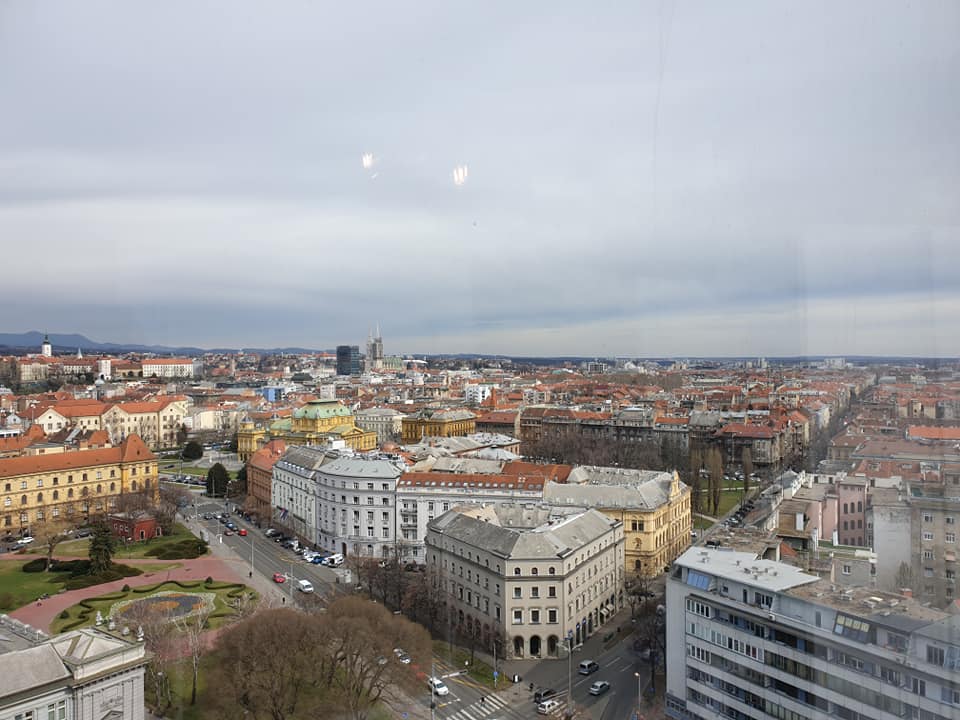
It was certainly a conference with a view. Below, the city of Zagreb, which has recently branded itself as 'Zagreb - the center of medical excellence.'
Because I am relatively new to the Croatian medical tourism world and live in Croatia, it is hard for me to gauge the global position of the Croatian health tourism industry. In addition to a chance to learn more about the industry from internationally respected experts, it is also an opportunity to find out what they think about Croatia's position and potential.
"Croatia is the new heart of medical tourism in Europe," said facilitator Daniel Coulton-Shaw in his opening remarks.
Coulton-Shaw is a man who knows the industry well, and who has built up a very successful dental tourism business from nothing in Slovakia, as well as being an international clinic mentor and the brains behind Global Clinic Ranking. He kindly agreed to an interview with TCN, which we will publish shortly.
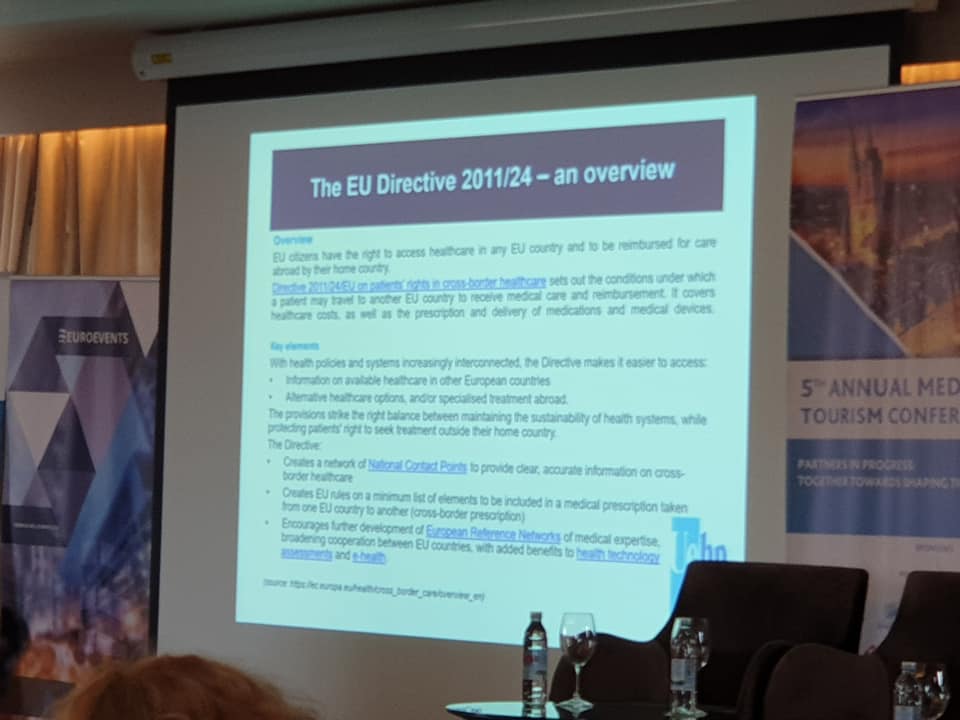
Among the many opportunities discussed over the two days, the potential of cross-border care seems to be one which Croatia and other countries could benefit from. It is not widely known that EU citizens can get their healthcare done in other member states (EU directive 2011/14, which came into force in 2013), which has the benefit of reduced waiting times and cheaper treatment. One example cited was in orthopaedics in the UK, where waiting times are three years and private treatment is among the most expensive in the world.
With its medical excellent, affordable prices and excellent reputation as a safe tourism country, Croatia is potentially the EU member state which could benefit the most.
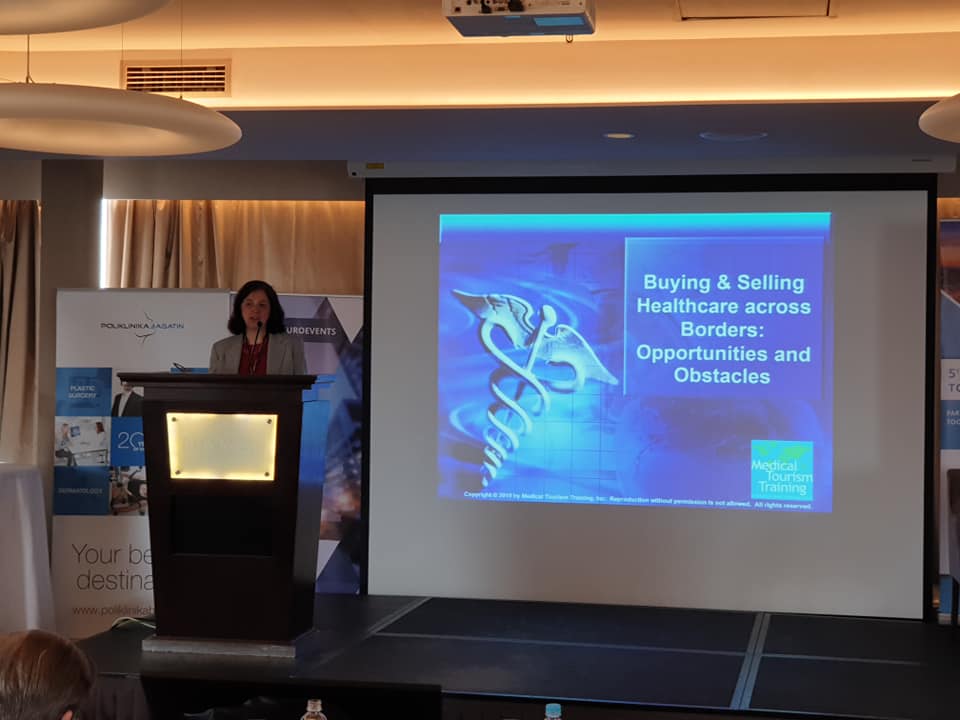
Among the many thought-provoking presentations, Elizabeth Ziemba looked at the opportunities and obstacles of buying and selling cross-border healthcare. It was fascinating to learn, for example, that companies in the UK have relationships with pharmacies in Mexico, where they fly employees to Mexico with generous per diem allowances - the savings on prescription costs make the saving tenfold. Or that Finland and (from memory) now have an e-prescription agreement to allow something similar.
Once such cross-border initiatives develop fully, the potential for boosting the Croatian medical tourism industry and the economy as a whole is immense.
If Croatia learns how to take advantage of the opportunity.

Irving Stackpole gave a stimulating presentation on the function of technology in the patients' journey, and how telehealth and telemedicine are already transforming healthcare and the relationship between patient and clinic. Both Stackpole and Ziemba will be back in Zagreb on March 26 for a niche workshop at the Bagatin Education Centre, as previously reported on TCN.
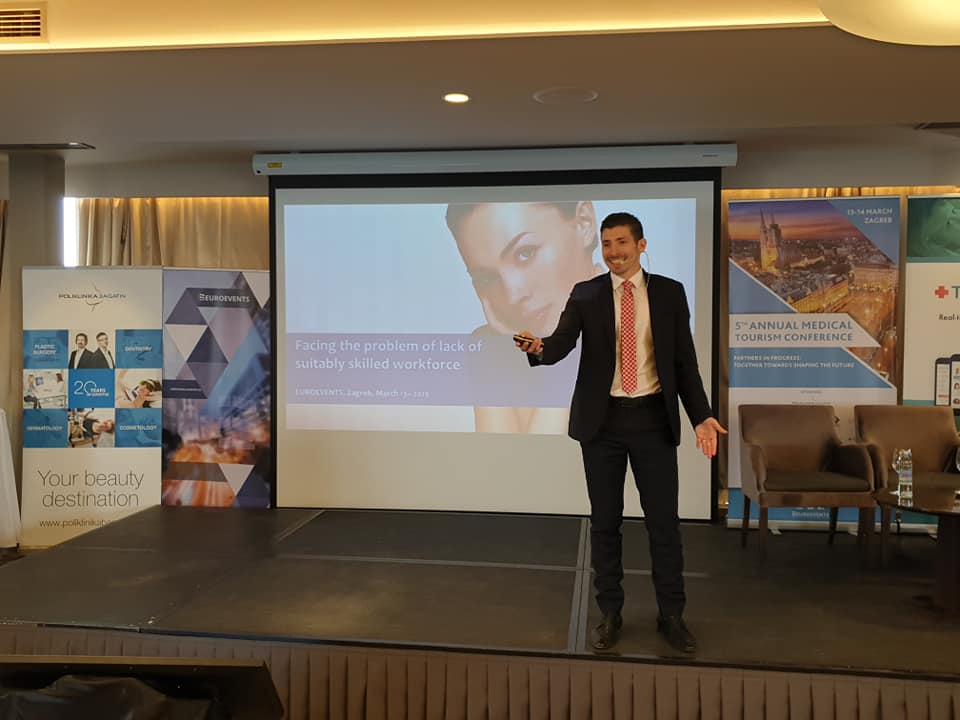
There was also local representation among the speakers, with Ognjen Bagatin, CEO of Bagatin Clinic in Zagreb (and now Split) talking on Facing the Problem of the Lack of a Suitably Skilled Workforce. It was the most high-tempo presentation of all, and one which I will dedicate another article to, for what is happening behind the scenes at Bagatin Clinic in terms of staff training is quite possibly unique in Croatia.
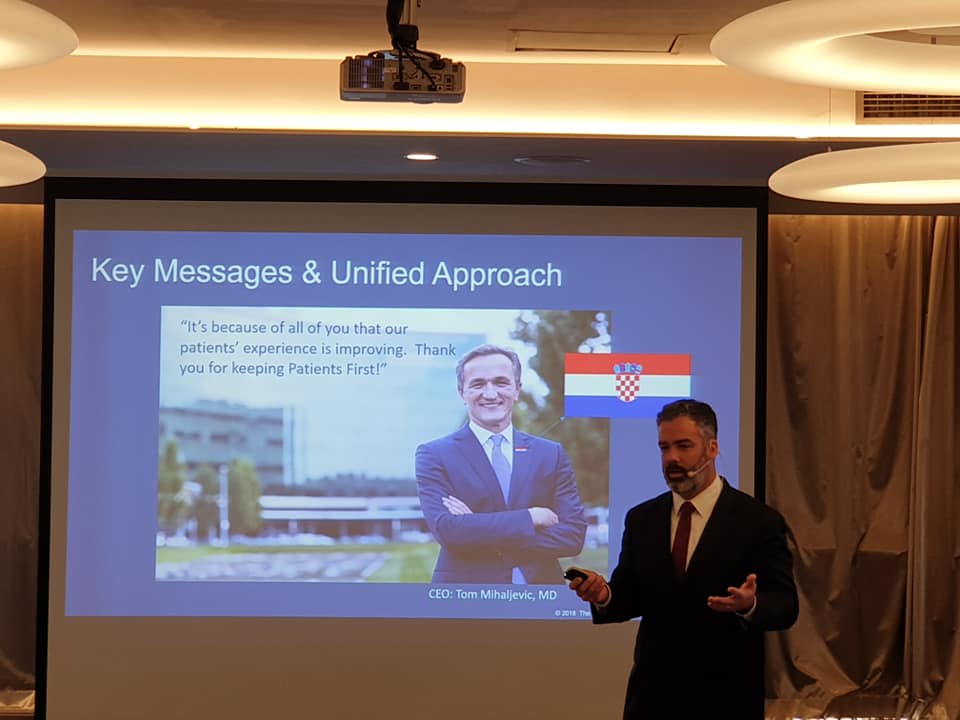
One of the biggest names in the world in patient care was also present, as Joe Sweet, Director of Cleveland Clinic's International Patient Experience, Joe Sweet, talked about Creating a Consistent Approach to High-Quality Patient Experience. With its 66,000 staff under new Croatian CEO Tom Mihaljevic, Cleveland Clinic was at the cutting edge of medical innovation. One new addition coming soon to enhance the patient experience, Sweet explained, will be the use of holograms to show and explain to the patient their individual situation. Sweet also did an interview with TCN before catching his flight back to the States, which we will publish soon.
The two-day conference, which was organised by Euro Events, continues today with a dedicated B2B workshop. A stimulating and educational two-days, as well as great chance to network and learn more how Croatia can develop its relatively untapped jewel.
Which is why it was surprising to see who was NOT at the conference.
With various official bodies coming together with great fanfare a few weeks ago to launch Health Spot Croatia, Croatia's hub for developing medical tourism, one might reasonably expect to see those stakeholders at such a quality conference.
I was certainly encouraged when I saw the programme. Both Zagreb Mayor Milan Bandic and Minister of Health Advisor Mate Car were due to give the opening remarks of the conference.
Neither appeared.
In fact, as far as I could see, only the Zagreb Tourist Board from the five key stakeholders from Health Spot Croatia came to the conference. No representation from the ministries of health, national tourist board, or chamber of economy.
Perhaps they have no need for such international expertise on their doorstep, and perhaps they have figured out Croatia's health tourism strategy all on their own.
A very stimulating two days, which TCN will explore in more detail in the coming days with interviews and features on Coulton-Shaw, Bagatin and Sweet.
To learn more about other conferences from Euro Events, visit the official website.
For the latest news from the Croatian medical tourism story, follow our detailed coverage.
Burning Dollars in Zagreb: From Cancelled Conferences to Health Tourism Reports
March 5, 2019 - Last month it emerged that the Zagreb Tourist Board spent 29,000 euro on a tourism conference which disappeared. This month's story looks at a US$50,000 investment in a health strategy document. Oh dear.
I love living in Croatia, I really do. And as I have written previously, life in The Beautiful Croatia is addictive, and I genuinely don't think I could live anywhere else; a little like malaria, once Croatia gets under your skin, there is no escape.
It used to be a blissful and happy existence, living on an idyllic Dalmatian island and blogging about happy tourism stories all day over a cold one in a cafe on the main square.
And then I started a national news portal, and I started to understand how Croatia really works. Looking back, I can't believe how naive I was, or how much different the reality is to the worlds that most expats here move in. Croatia changed for me, but the change only sucked me in deeper. I wrote about the change some time ago - A Tale of Two Croatias: Before and After the Uhljeb Discovery.
And the more I learned about the corruption and how Croatia really works, the more shocked I became. My Croatian friends were laughing at me, enjoying my progress of discovery of the realities of life here. They still are, as every day brings something new.
Being the first daily Croatian news site with Google News accreditation meant that I had inadvertently got into something larger than planned. Suddenly I realised that TCN had the potential to be a window to the international community to showcase stories which were not about tourism and the endless sunshine. I got my first taste of this when we did the scandalous story of The Sun's investigative 'journalist' who went overland from Istanbul to Paris, via Croatia, without being asked to show his passport once.
After the then Croatian Minister of the Interior posted proof online that not only had he been checked on entry from Serbia, but that he had exited Croatia with a flight from Zagreb to Paris, TCN did the story. Hardly the intrepid overland journey. Our English version of the story went global, with my editorial quoted in Huffington Post and The Sun removing the article and stating that it had changed its freelance hiring practices.
With a growing readership of the Zagreb diplomatic community, EU institutions, international media and businesses working in Croatia, perhaps we could even make a difference, I thought. More Croatian laughter, this time over lunch with a Croatian media friend, who dampened my expectations of what I could achieve. A national name, my friend has uncovered several stories of corruption and incompetence over the years.
"There is no point. Nothing will change. Nobody cares. You can do brilliant work and - apart from professional pride at a job well done - it really doesn't matter."
And - sadly - he is right.
Last month, in collaboration with Goran Rihelj from HR Turizam, we told the story of the cancelled CETS tourism conference, and how organisers Andy and Lu Buchanan disappeared with 45,000 of money from the Croatian National and Zagreb tourist boards. When adding all the other payments from would-be exhibitors, the number is probably closer to 200,000 euro. All they left in their wake was a disabled website, lots of unpaid bills, and a recently formed company in Spain with a startup capital of just 3,000 euro.
I was actually surprised at how much media attention the story received, with the Zagreb tourist board director even appearing on the national news to explain what happened. And then, once the Facebook shares and comments subsided, the story died a death.
As it always does in Croatia. No accountability. No consequences.
"It wasn't even a story," my media friend said. "With all the other stuff going on here, I am surprised at the amount of coverage."
Followers of TCN will have noted that we are taking a greater interest in medical tourism in recent times. Like most other people in the country, I had no idea that Croatia had such world-class private healthcare, or the potential to be in the world's top ten. My journey of discovery started 18 months ago when I wrote a feature story on three of the biggest names - Bagatin Clinic, Svjetlost Eye Clinic and St Catherine Specialty Hospital - which led to Health Tourism is Coming Home: Why Zagreb is the Next Big Medical Tourism Destination.
My journey of discovery took me to conferences in Crikvenica and Zagreb, wellness centres in Krapinske Toplice, clinics in Split, and interviews with some of the biggest names in the medical tourism industry - Keith Pollard, Editor in Chief of International Medical Travel Journal, Sherene Azli, CEO of the Malaysia Healthcare Travel Council, and global speakers such as Ilan Geva and Dr Prem Jagyasi. All of them in Croatia helping the emerging medical tourism story. And they all said the same thing - Croatian has the potential to be in the top ten medical tourism destinations in the world in 10 years, if only all the stakeholders can come together.
The economic benefits, and the year-round tourism that medical tourism can bring, are plain to see. If Croatia really could be in the world's top ten in such a growth industry, surely this should be a priority to develop, with a national strategy including stakeholders all singing from the same hymn sheet. But the more I looked at the industry, the more I saw how disorganised it was, with a few trailblazing clinics going their own way. International speakers told me that the Kvarner Health Cluster was better known as a health destination than Croatia itself (well done, Team Kvarner), and Team Malaysia talked of their hashtag #WeWinTogether and how the ONLY strategy can be to build the national brand first and go from there.
It would not be correct to state that official bodies are not investing in medical tourism. They are. A speaker from the national tourism board told a conference I attended in Crikvenica that they had invested 4 million kuna, without giving any specifics. And then I heard stories from various sources that the Zagreb Tourist Board had invested 100,000 euro into a health tourism strategy document for Zagreb (when I asked for confirmation, I was told that the actual amount was US$50,000). While it seemed a little insane to me to do a feasibility study just on one city and not the whole country while the national tourist board was spending millions of kuna on another strategy (#WeWinTogether), at least it was progress.
Or so I thought.
Until I read the report, all 71 pages of it, full of shiny charts and lots of data, much of it with little relevance to Zagreb. And having read it twice, I am still trying to find the strategy.
Fifty thousand dollars.
Even before we sit down to read this enlightening document (parts of which I doubt were written by a native speaker due to numerous spelling and grammatical errors), the first alarm bell went off when looking at some of the shiny charts. I would like to publish examples here, but reproduction without permission is strictly prohibited, so you can take a look for yourself. Several of the charts have a copyright of 2017-8, while citing another copyrighted source dating back to 2015. So, for our fifty thousand dollars, we are being treated to data which is four years old.
Not only that, but once you start reading, there are other gems to behold. Did you know, for example, that in 2014, 28 million Italians holidayed overnight abroad? Great data from five years ago. Or that in 2015, Visa revealed that German households spent $74.4 on travel? Four years ago.
Fifty thousand dollars.
The impression I had on reading this document is that it had some quite useful general data on the global health tourism industry, most of which was barely relevant to Zagreb. The section on penetrating the US market is a classic example. More than two pages of statistics and facts are given over to the American market. The recommended strategy (this is what you get for $50,000) seems to be that Zagreb has good affordable healthcare and it should market that to American tourists and also make direct contact with American companies.
That's it.
And the sad thing is, the report misses out completely on the biggest opportunity Croatia has from the North American market - its diaspora.
As Professor Nikica Gabric, founder of the pioneering Svjetlost Eye Clinic, said in the video above:
"What we should do first is let Croats who live around the world know about the quality and potential of health tourism in Croatia. And then the Croatian diaspora will be the best ambassadors in their communities to explain that in addition to being a beautiful and safe country, they can get quality medical care for significantly less money."
The love for the homeland is real, and the Croatian diaspora has been sending back billions over the years, and many are very willing to buy Croatian any time they can. So much so in fact that last week we reported on the fact that Croatian diaspora remittances are now bigger than foreign investment in Croatia - some two billion euro.
There are an estimated 1.2 million Croatian diaspora in the United States, about 40% of the global Croatian diaspora and the source of a large chunk of that 2 billion.
It is something that the Zagreb Tourist Board seems to be unaware of. Apart from a passing reference to the diaspora in Germany, I could not find any inclusion of the diaspora as part of the strategy. Having read the report, I sent some questions to the Zagreb Tourist Board, which they were kind enough to answer. I asked about the lack of diaspora focus in the document.
"Our diaspora is mostly located in targeted countries such as Germany, Austria, Slovenia and Italy."
Really?
There are an estimated 3 million people in the Croatian diaspora. According to figures published a few years ago, here are the top 6 counties:
- United States 1 200 000
- Germany 350 000
- Argentina 250 000
- Australia 250 000
- Canada 250,000
- Chile 200 000
About 2.15 million people, 70% of the diaspora, which last year sent back 2 billion euro, but not a target group for incoming health tourism, despite the fact that many come on holiday to Croatia every year and do not have to be targeted as the non-diaspora American market.
Surely, as Professor Gabric states, the diaspora is the place to start. Not only with their own treatment, but talking to friends in the pubs of Dublin, Munich and Stockholm, about how Croatia is a fantastic tourist destination where you can pay for your holiday with medical tourism savings.
So what are the target countries identified? Slovenia, Italy, Austria, Germany, Russia, the United States, and the United Arab Emirates.
Not the UK? I was surprised at the omission. I was even more surprised when I read some of the info in the report. Apparently about 6% of Brits go to Croatia already for dental treatment, so the market is already there and just needs to be developed. Croatia is increasingly popular with Brits and only two hours away. There is a culture of heading to this part of the world for dental and other healthcare treatment from the UK. So much so, the report itself notes, that Hungary generated $600 million from dental tourism back in 2008. If Hungary can do it, why can't Croatia - Keith Pollard told me that Croatia could take 25% of that market if it got organised. The Zagreb report even has statistics on who is going for treatment. Of the 60,000 dental tourists annually, 23,500 are British, followed by Austria (16,000) and Germany (13,500).
But the UK is not a target market for Zagreb.
The report talks about the importance of Zagreb Airport. It also explains how other countries partner with the national airline, to provide discounts for health tourists to the country - 50% from Turkish Airlines for example. Malaysia also has a dedicated medical tourism arrivals hall at its airports. So it was something of a surprise in the report when I got to another shiny chart listing all the stakeholders who should be involved in developing Zagreb's health tourism strategy.
Croatia Airlines and Zagreb Airport did not make the list - they are not stakeholders in developing Zagreb's medical tourism strategy.
There are lots of charts, all beautifully presented. One of my favourites is a price comparison for certain medical procedures - very useful. Except that the price comparison is limited to just three countries - Croatia, UK and Italy. Quite why the UK is included if it is not a target country is an interesting question, but not as interesting as why there is no data to compare with the countries which are targeted.
Fifty thousand dollars.
The only firm conclusion I took away from this report was the recommendation to form a central coordinating body called ZAMTO to move Zagreb medical tourism forward. No sh!t, Sherlock, why didn't we think of that?
I asked the Zagreb Tourist Board if they had learned anything from the report, and if so, what?
"Having international partner gives us more objective approach, we find especially interesting SWOT analysis of current situation regarding the health tourism in Zagreb and Croatia."
Q. Apart from the fairly obvious point that a central coordinating body (ZAMTO) should be formed to promote medical tourism, the report was very light on concrete suggestions. What other concrete suggestions and recommendations did the study have?
A.Creating central coordinating body (ZAMTO) is highly valuable insight and we believe that creation is just one small step in making the organization work since its role should be to bring together the key stakeholders.
Hmmm.
I asked several industry professionals if they had read the report and if yes, what had they learned. There was a consensus.
Absolutely nothing.
I could go on about the omission of Zagreb's strengths (it has 3 of the top 6 dermatology clinics in Europe, or it is the only place in Europe which is offering the new Mayo Clinic co-founded pharmacogenetic test), but I fear I might lose you.
There was just one more question to ask the Zagreb Tourist Board:
Q. In terms of value for money for the Croatian taxpayer and Zagreb Tourism Board, how would you rate this report out of ten?
A. We would give a high rate for this report, although Croatian taxpayers did not participate in it, since ZTB budget is derived from the membership fees and tourist tax.
So all is well then.
Ha, my media friend just arrived.
"You are wasting your time, nothing will change."
"I know."
"Do you feel better for writing it at least?"
"Not really."
"Oh. Well let's go for a beer."
To follow the latest in the Croatian medical tourism story, follow our dedicated page.
Developing Croatian Health Tourism: Irving Stackpole & Elizabeth Ziemba Zagreb Workshop
March 4, 2019 - More international expertise is arriving to help the development of the Croatian medical tourism industry, as Bagatin Education Center announces another niche seminar.
And still they keep on coming...
It is now about 18 months since I first discovered the huge potential of medical tourism in Croatia, writing my first article on the subject after visits to Bagatin Clinic, Svjetlost Eye Hospital and St Catherine Specialty Hospital. Those visits opened my eyes and culminated in Health Tourism is Coming Home: Why Zagreb is the Next Big Medical Tourism Destination.
Since then, the story - and the potential - has only got more interesting, and after I wrote 25 things to know about health tourism in Croatia, I realised that here was a real treasure that was largely untapped.
I attended a couple of health tourism conferences last year to broaden my education, and I was amazed at the wealth of international speakers who were coming to Croatia to talk about health tourism. Even better for TCN, they were all very happy to speak to me about the position fo health tourism in Croatia and its potential. Keith Pollard, Editor-in-Chief of the International Medical Travel Journal; Sherene Azli, CEO of the Malasia Healthcare Travel Council; global branding expert Ilan Geva and global speaker Dr Prem Jagyasi. All in Croatia - all highly respected in their particular field.
The conclusions were the same - Croatia has the potential to be in the world's top ten in the medical tourism industry, if officials can unite and push the industry forward on a united front, a topic we looked at in depth, as well as the fine example of the Malaysian model to follow.
It was meeting branding guru Ilan Geva that opened my eyes just a little further. For while all the medical tourism conferences are very high profile (and the next one of note is the 5th Annual Medical Tourism Conference in Zagreb on March 13-14 by Euro Events with another world-class lineup), I met Geva at a very specialised seminar on the branding of Croatia as a medical tourism destination. There were just 15 people there, all key stakeholders in the industry (myself excepted), a very intense and productive session organised by Bagatin Clinic. You can read more about it here.
So while the increasing number of health tourism conferences are raising the profile of Croatia as a medical destination, there is a second level of education and institution building, which is being conducted largely off the public radar. Much of this is being organised by Bagatin Clinic, which is very aggressively (in the nicest possible sense of the world) pioneering the industry's international profile. By bringing the key local stakeholders together and connecting them with experts such as Geva, the boutique Bagatin seminars are strengthening existing connections and forging new ones.
And the promotion and education continues...
Next up at the Bagatin Education Centre are two more international industry heavyweights, who are introduced by Bagatin, above, better than I could do myself - Elizabeth Ziemba, President of Medical Tourism Training, and Irving Stackpole, President of Stackpole & Associates.
The title of the one-day seminar is Taking Cluster Development to the Next Level: Changing the Course of Medical Travel. It will be one more part of the learning process for me. Tickets are limited and can be reserved through Bagatin Clinic.
For more on the Croatian health tourism story, follow our dedicated page.
Meet Croatia's Health Tourism Providers: 2. St Catherine Specialty Hospital
March 1, 2019 - As Croatia looks to develop its medical tourism industry, TCN continues its look at the key health tourism providers. This week, St Catherine Specialty Hospital.
Several months ago, I was invited to a press conference at St Catherine Specialty Hospital. TCN gets invited to a lot of press conferences, but we rarely attend due to time and limited resources. But there was something a little different about this invitation, and as I was planning to be in Zagreb that day, I decided to attend.
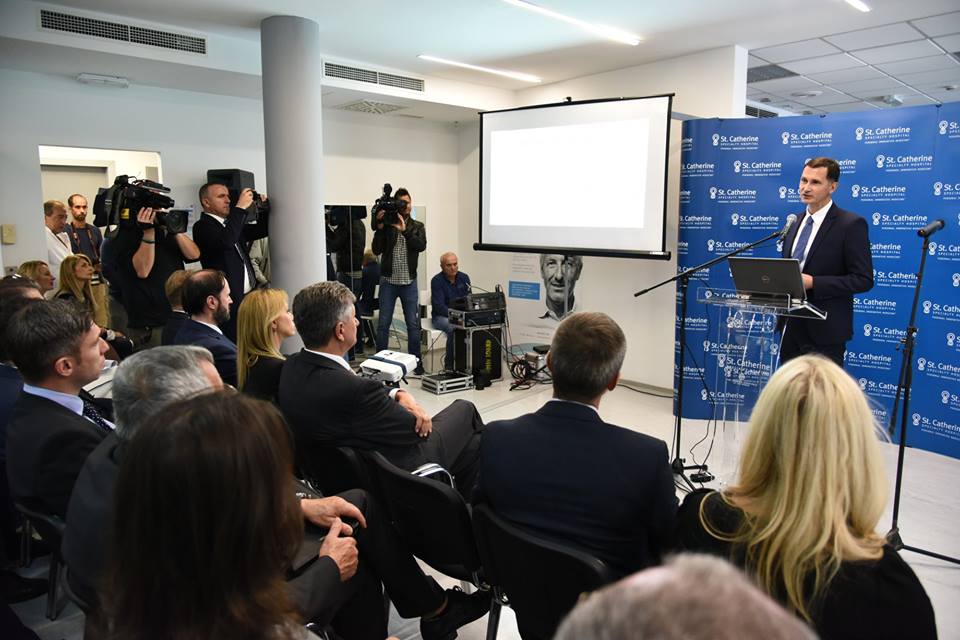
(Prof dr.sc. Dragan Primorac at the OneOme press conference in Zagreb)
I was blown away.
For two reasons.
The first reason I was blown away was what was being announced.
Healthcare is not a topic I know a great deal about, but even I could see that the unveiling of the new OneOme RightMed pharmacogenetic test which had been developed in cooperation with Mayo Clinic in the States was a potential game-changer in global and personalised healthcare.
I learned that the fourth-largest killer in the United States each year was due to adverse drug reaction (ADR), more than 100,000 people a year. The prescribing of drugs which have little or no effect also costs over $100 billion a year. A drug which works for one patient may not work for another, and slower metabolisms also differentiate the speed with which medicines work on patients. The policy of blanket prescribing for all is both costly, ineffective and deadly. If only there was a way to personalise the diagnosis of a patient's needs.
Enter OneOme. The RightMed pharmacogenetic test does exactly that. After a simple swab OneOme processes the sample and generates the RightMed test report. Finally, you visit a clinic representative who helps you understand the test results. Depending on your genes, your body may break down a drug too slowly or too quickly. If you metabolise a drug too slowly, you may be exposed to too much of it, which may result in an adverse drug reaction (ADR). If you metabolise a drug too quickly, you may not get enough to have any effect at all. A OneOme RightMed test helps to identify this for your doctors.
A Mayo Clinic trial of 3,600 patients whose RightMed information was available to doctors led to a 30% reduction in hospitalisation of heart patients.
The potential saving to national healthcare systems is mind-boggling. You can learn more about OneOme in this interview with Prof. dr. sc. Dragan Primorac of St Catherine Specialty Hospital.
The second reason I was blown away was that the first partner chosen to provide the OneOme RightMed test in Europe was St Catherine Specialty Hospital in Croatia.
Yes, tiny Croatia, at the forefront of cutting edge medical innovation. I was stunned.
Stunned is an emotion I have encountered a lot since I discovered the emerging medical tourism story 18 months ago. I visited three of the country's top private healthcare providers (Bagatin Clinic and Svjetlost were the others) as part of my research, and this led to my first visit to the St Catherine Zagreb facility. What I found at all three facilities was a level of customer care that far exceeded the perception of healthcare in Croatia. You can read my first article of discovery - Health Tourism is Coming Home - Why Zagreb is the Next Big Medical Tourism destination.
A member of the Leading Hospitals of the World, the OneOme press release introduced St Catherine as follows:
St. Catherine is a university teaching hospital and the official hospital of the Croatian Olympic Committee and of the Croatian Football Federation. The Hospital is the first European recipient of U.S. Global Healthcare Accreditation and known for introducing the integrative concept of personalized medicine in clinical practice.
I was soon to learn that St Catherine Specialty Hospital is so much more than that, as the official St Catherine website explains:
St. Catherine Hospital is a proud member of the prestigious group "The Leading Hospitals of The World", while In June, 2015., The International Certification Association (ICERTIAS) announced that the St. Catherine Hospital won the top-Quality medal (QUDAL - QUality meDAL) along with award of St. Catherine Hospital being the best private hospital in the Republic of Croatia, which is all according to the customer’s/patient’s opinion and judgement. It is also worth mentioning how during the studies, the ICERTIAS was using CAWI – DEEPMA (Computer Assisted Web Interviewing – Deep Mind Awareness) methods in order to analyze and examine all the received data.
St. Catherine Specialty Hospital’s membership in the International ICERTIAS Customers’ Friend programme – “Because we care about our customers”, attests to the special care and attention that Specialty Hospital give to patients and their problems, as well their commitment towards developing long-term customer satisfaction from the very beginning – from the first phone call up to the final phase of treatment.
Nevertheless, the "Super-brands organization" based in Great Britain (since 1995), has proclaimed St. Catherine in July 2016, as one of the strongest and the most successful brands in that year, thus, along with that, St. Catherine won “Croatia Superbrands 2016 Award” regarding its quality, reliability and distinction.
On November 6th, 2015., Ministry of Science, Education and Sports of the Republic of Croatia announced that the St. Catherine Hospital become “Scientific Center of Excellence for the Personalized Medicine in the Republic of Croatia” as a part of Consortium that includes the top healthcare and scientific institutions in the country and such field.
In April 2017, St. Catherine was awarded the “Best Hospital Award” for the strong position at the national market and in international sector ratings, successful implementation of modern management technologies, staff excellence and the efficient marketing strategy. Mrs Jadranka Primorac, M.Sc., Board Member of St. Catherine Specialty Hospital was honoured as a “Manager of the Year” by the Europe Business Assembly, Oxford, UK.
In April 2017 St. Catherine hospital has won a major international medical tourism award for their efforts in attracting international patients to Croatia. St. Catherine Specialty Hospital was named “International specialist patient centre of the year" by medical travel publication the International Medical Travel Journal Medical Travel Awards 2017 at their annual awards ceremony, the IMTJ Medical Travel Awards 2017.
In May 2017, St. Catherine Specialty Hospital was selected among the top 10 European companies in the category of 'The Award for Customer Focus' at the European Bussines Awards, for its business success and excellence, innovation and ethics in business. St. Catherine Specialty Hospital has been selected among 34,000 businesses that have been involved in this prestigious competition. Also, St. Catherine Specialty Hospital has won the status of the "National Champion for the Republic of Croatia in The European Business Awards".
The main hospital is a short drive from Zagreb in the town of Zabok. I took my daughter there for treatment and was amazed at the size of it in gorgeous and spacious grounds. St Catherine treats 35,000 patients a year, and after years in the Croatian public healthcare system, it was a totally different experience altogether, both in the diagnosis and the customer care.
Croatia has its poster child heroes in various sectors of society who can compete on the world stage in their fields, such as Mate Rimac and Luka Modric. Add St Catherine Specialty Hospital to that list in the field of medical tourism.
To learn more about St Catherine Specialty Hospital, visit the official website.
To learn more about the Croatian medical tourism story, follow the dedicated TCN page.
5th Annual Medical Tourism Conference in Zagreb: Meet the Speakers – Ognjen Bagatin
February 28, 2019 - Another important international health tourism conference is coming to Croatia. As previously reported on TCN, the 5th Annual Medical Tourism Conference will take place in Zagreb on March 13-14. TCN catches up with one of the keynote speakers, Ognjen Bagatin, CEO of Bagatin Clinic in Zagreb (and also now in Split).
The 5th Annual Medical Tourism Conference will take place from March 13. How important is the choice of Zagreb for medical tourism in Croatia?
We are delighted that the conference will be held this year in Zagreb after the successful 2018 event in Berlin.
Croatia is at the beginning of a potentially incredible medical tourism story, with many experts of the view that it has the potential to be in the top 10 countries in the world for health tourism within 10 years. One of the biggest challenges we face is visibility in the global market. Conferences such as MTCE are extremely important for Croatia, and we look forward to giving our international guests both an amazing conference and an incredible and warm Croatian hospitality experience.
There seems to be an increasing number of health tourism conferences in Croatia. What makes this one stand out?
Conference organisers EuroEvents always put on excellent conferences, and they have a great international reputation. Just looking at the quality of the superb list of speakers is really exciting, and my Croatian roots are looking forward to welcoming Joe Sweet from Cleveland Clinic, for example – Cleveland Clinic's CEO Tomislav Mihaljevic is Croatian.
The focus of this year's conference will focus on how to win international patients in the era of digitalisation and globalisation. MTCE is a very interactive platform, which allows practitioners and leading experts to share, discuss and build strategies for future growth. In addition to the conference, the B2B workshop on day 3 should be particularly productive.
You yourself are a speaker at the conference.
Yes, that's correct, and it is an honour to share such a platform with such an array of accomplished and influential speakers. My subject will be “Facing the problem of the lack of a suitably skilled workforce.”
As you know, Croatia is sadly facing another wave of economic emigration due to lack of opportunity here. Finding the appropriately skilled staff can be a challenge, but the potential of a successful medical tourism industry here has the potential to partially reverse that dynamic, and offer challenging and fulfilling futures for thousands.
What do you hope to gain from this conference yourself?
Bagatin Clinic is striving for excellence in all areas of the medical tourism experience. We are a young buy dynamic clinic which is expanding rapidly, but we also have much to learn. The chance to interact with such a quality field of speakers, and to network with other international stakeholders can only be a good thing. The fact that the conference is being held in Croatia is one more page in our medical tourism story.
Some people may be surprised to hear that Croatia is being touted as one of the rising stars of medical tourism. Tell us why and a little more about the potential.
There are so many reasons why Croatia is an ideal destination for medical tourism. Our very best private clinics and hospitals compete on the world stage. For example, the only place in Europe where you can take the new Mayo Clinic-sponsored OneOme pharmacogenetic test is in Zagreb.
Croatia has a health tourism tradition dating back 150 years, and we offer outstanding and affordable care in dentistry, dermatology, cosmetic surgery, eye surgery and stem cell therapy, to name a few. Many of our surgeons are internationally acclaimed, and equipment is state of the art.
Add to this the fact that Croatia is a safe and stable country in the EU within easy reach of all European capitals, and where English is widely spoken. A country with a strong tourism and wellness tradition, where the culture, heritage, climate and gastronomy make it an ideal place to recuperate after treatment. Our potential is enormous.
In order to move forward, we need to be more united and focused on the goal of developing the country brand of medical tourism. Looking to Malaysia, there is a shining example of how to achieve this. The recent Health Spot Croatia conference was an important step in this direction, bringing all the important stakeholders together to build a strategy. The EuroEvents MTCE conference compliments that nicely, and I am really looking forward to a successful event.
Ognjen Bagatin is CEO of Bagatin Clinic, one of Croatia's leading clinics and named last year as the best dermatology clinic in Europe. In addition to the main base in Zagreb, Bagatin Clinic opened its doors in Split earlier this month.
TCN has a limited number of discounted tickets for the 5th Annual Medical Tourism Conference, priced at 600 euro including VAT if purchased by close of business tomorrow. Contact us on This email address is being protected from spambots. You need JavaScript enabled to view it.
For more information about the conference, visit the official website.
For more about health tourism in Croatia, visit the dedicated TCN page.
Strong Speaker Lineup for 5th Annual Medical Tourism Conference in Zagreb
February 25, 2019 - The Croatian medical tourism story continues to evolve with another prestigious event, as Zagreb hosts the Euro Events 5th Annual Medical Tourism Conference in Zagreb.
Another day, another chapter for Croatia's health tourism industry.
What industry insiders have known for a while is slowly reaching an international audience; there is huge potential for Croatia to become a global player on the international health tourism stage, with several experts agreeing that Croatia could be in the world's top ten medical tourism countries within ten years.
There is an increasing interest in Zagreb and Croatia from health tourism professionals, and next month sees another important milestone for Croatia's medical tourism story, as Euro Events will be staging the 5th Annual Medical Tourism Conference and Workshop in Zagreb.
Held last year in Berlin, this year's event will take place at the Westin Hotel in Zagreb. The two-day conference will be held on March 13-14, with a B2B workshop on the 15th.
Conference producer Stefan Ristovski introduces the event in the official brochure:
"EuroEvents is pleased to invite you to the 5TH Annual MTCE conference, the leading industry event of 2019!
"This year our focus is on winning over international patients in the era of digitisation and globalisation!
"MTCE will provide an interactive platform, during which practitioners and leading experts in the field will share, discuss, and construct strategies for future growth and innovation for the purpose of creating and sustaining successful facilities.
"Furthermore, MTCE 2019 will focus on revealing the key strategies for success based on providing the ultimate client tailored experience, as well as defining the trends that will shape the future of medical tourism.
Inspire and be inspired, discover and be discovered, join us today and experience the full potential of MTCE 2019! "
As one would expect for such a prestigious conference, the quality and variety of speakers is impressive, very international and covering a wide range of aspects of medical tourism. Topics covered on the first day of the event include
- The implementation of the EU directive on cross-border healthcare and the position of European private hospitals.
- Buying and selling healthcare across borders: opportunities and obstacles.
- Stellar healthcare service that attracts new business by innovative medical treatments.
- Facing the problem of a lack of a suitably skilled workforce.
- Cyberknife - 12 years experience of Iatropolis radiological surgery.
- Hello # How is your @ and how to communicate.
- Clinic reputation = clinic revenue
- Patients' experience - a key to efficient and effective business.
- The patient will see you now - telemedicine and the transformation of medical travel.
- Ensuring continuum of care worldwide.
- Future of harmless cancer treatment.
The second day has an equally absorbing range of presentations and discussions:
- Creating a consistent approach to a high-quality patient experience.
- Creating the next dimension customer experience and anticipation of patients' expectations: drawing conclusions from fertility patients.
- New trend - bringing the doctor to the patient and creating affordable practice.
- Overview of the medical tourism market of Russia and CIS - patients' preference for treatment abroad.
- Preventative health and reconnection with nature.
- Development of health tourism - quality management strategy for foreign patients/guests.
- Why do international patients choose one-stop clinics? Understanding the strategy of patient care now and in the future.
- Building a diverse cross-border network for the international patient group.
- Making medical tourism sustainable by getting more patients from your enquiries.
Among the very international speakers, Croatia is also represented by Bagatin Clinic CEO Ognjen Bagatin, who has been spearheading Croatia's drive to put itself on the global health tourism map. A Zagreb clinic already with an excellent international reputation, Bagatin last week officially opened in Split, a huge step for health tourism in Croatia, and one which many tourists flying into Split this summer will be taking advantage of.
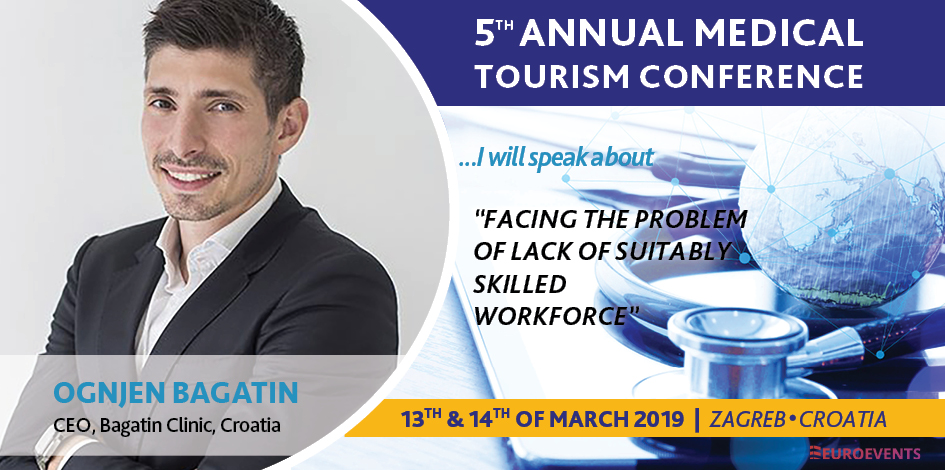
TCN has managed to secure a few tickets for the two-day conference, at a price of 600 euro including VAT if you book no later than this Friday. If you are interested in more information, contact us at This email address is being protected from spambots. You need JavaScript enabled to view it..
With the main conference over, it is time to get to work. The third day of the event is given over to B2B networking, as Euro Events explain:
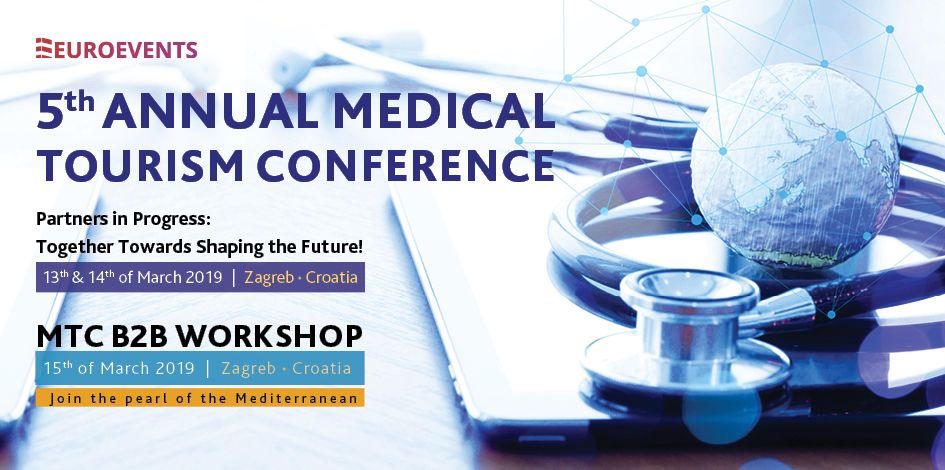
B2B Meetings are an essential way of building long term business relations with other professionals from your field. Medical Tourism Conference.
B2B Workshop is gathering worldwide top important players of the medical tourism conference, including: health insurance companies, travel agents, tour operators and facilitators, among others.
With pre-scheduled meetings, you will get the opportunity to interact with more 30+ companies that are looking to expand their business network.
We are welcoming you in Zagreb, Croatia – one of the most popular destinations for Medical Tourism, with more than 18 million tourists per year. Come and see the benefit of what this country can offer you.
For more information on the B2B workshop, click here.
For the latest news from Croatia's medical tourism story, visit the dedicated TCN page.

